«Accident Operations Forces» – How Ukrainian «Hospitallers» are hardening military paramedics
“We will do everything to make things difficult for you!”
“During the exam, there will be one or two panic attacks”
“You’re aces. I want to congratulate you on your first graveyard!”
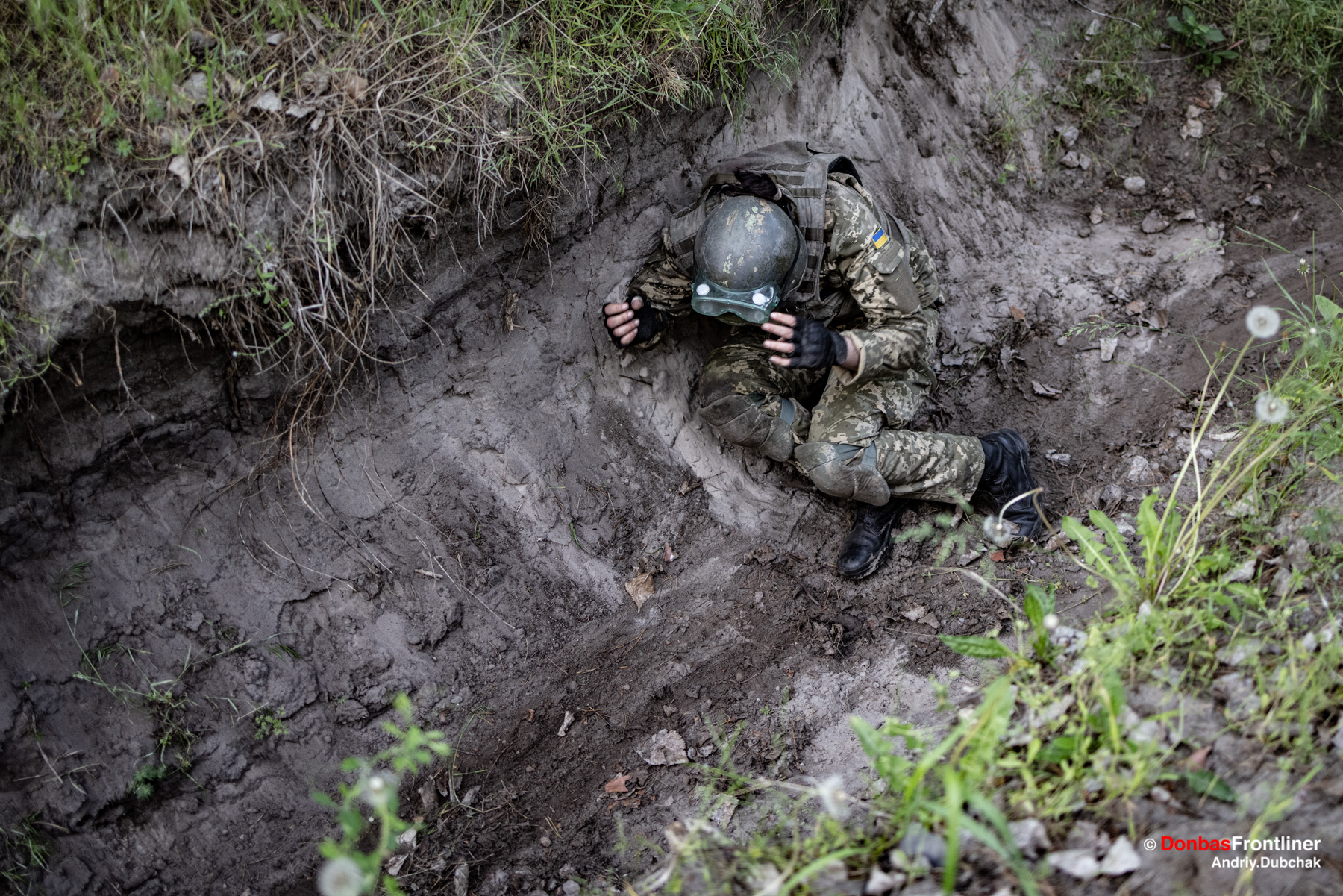
The first lessons of pre-medical care are going ahead with difficulty – both emotional and physical. Seventeen people are divided into three groups – “Bravo”, “Alpha”, and “Charlie” – in a fashion similar to that of the U.S. army.
They try on bulletproof vests, helmets and protective glasses. Some do so as it were routine, while others are less sure of themselves. Some are dressed in camouflage, while some are in athletic clothes. Each of them receives a stripe embossed with the emblem “Hospitaller Cadet”.
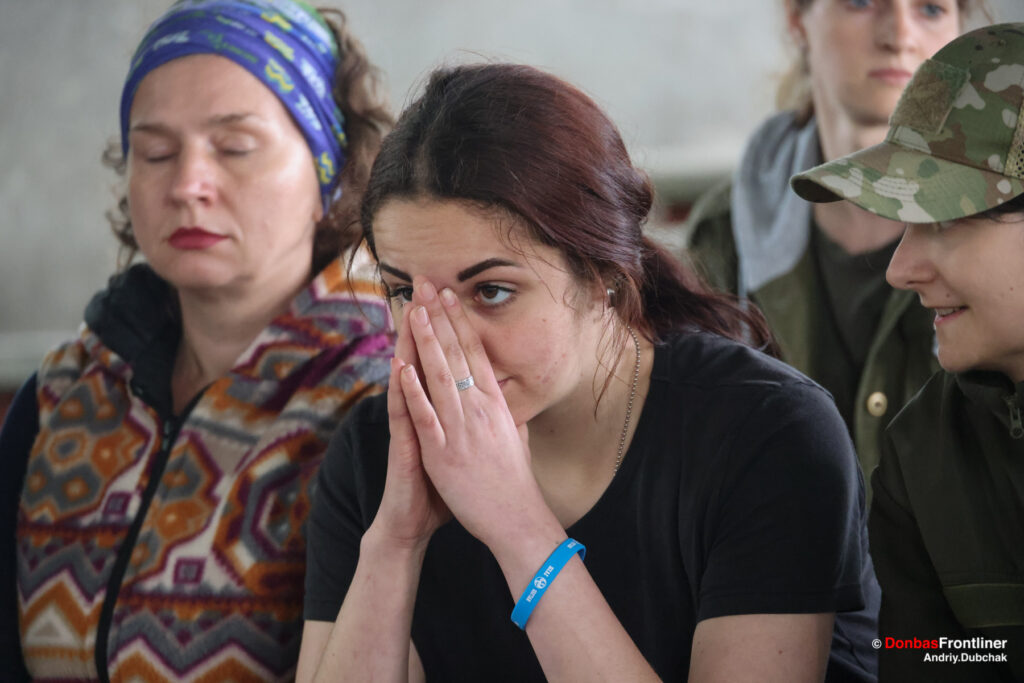
Men and women of varying age, education, physical fitness, worldviews and experience have arrived at the village of Dmytrivka in Dnipropetrovsk Region to hone their skill of rescuing others from potential death.
“We do not administer treatment – our task is to save lives”, the instructors emphasizes.
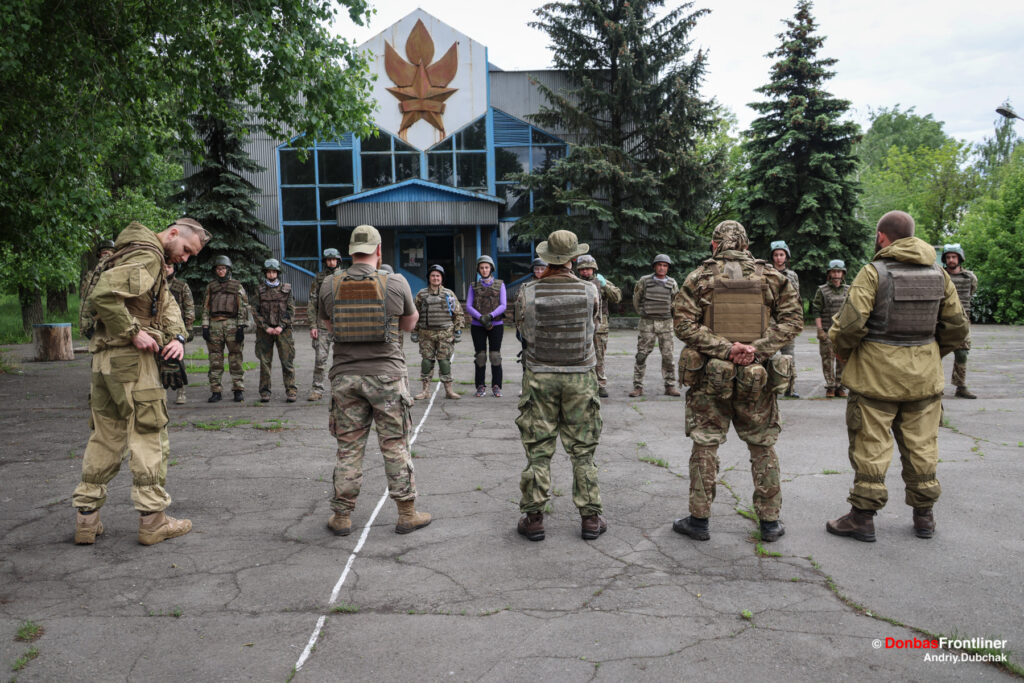
These small buildings once housed a children’s summer camp. The beds with spring mattresses, “plaques of honor” [Soviet-era remnant created by the government to exemplify civil service and labor] and other attributes remind you of the past days.
Here, now, in the places of children’s campfires, grenades and detonators are exploding, and trenches are being dug on the football pitch.
The base that is now here hosts training exercises for the “Hospitallers”. For these newly-minted cadets, the next week is going be difficult in a number of ways – and equally unforgettable.
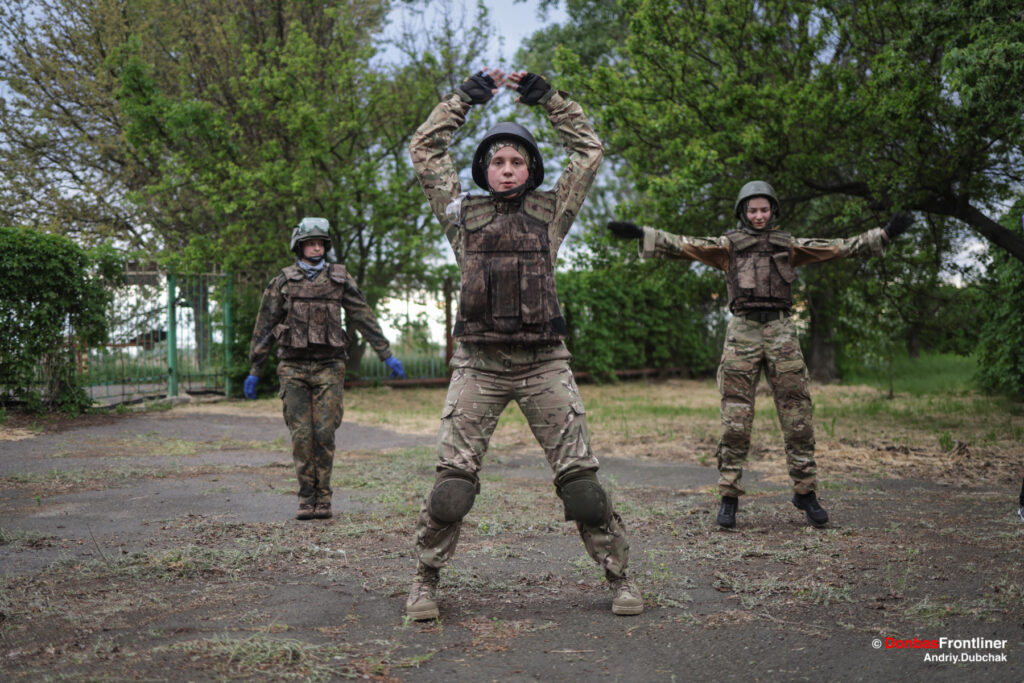
Almost knights
The volunteer medical battalion “Hospitallers” was founded in 2014 in the ranks of “Pravy Sektor”, which since 2015 has been an incorporated part of the Ukrainian Volunteer Army (Ukr.: Ukrainska Dobrovolcha Armia). Volunteer medics later founded the communal outfit “Dnipro Hospitallers”. When war began to break out, Hospitallers founder and leader Yana Zinkevich had only just finished school. Then, instead of beginning study at the medical institute where she had envisioned herself, Zinkevich joined the Ukrainian Volunteer Corps (Ukrainska Dobrovolchy Korpus). She took up the duty of rescuing the wounded, and, in turn, she founded a medical service which has been and continues to be one of the most effective of its kind on the battlefront.
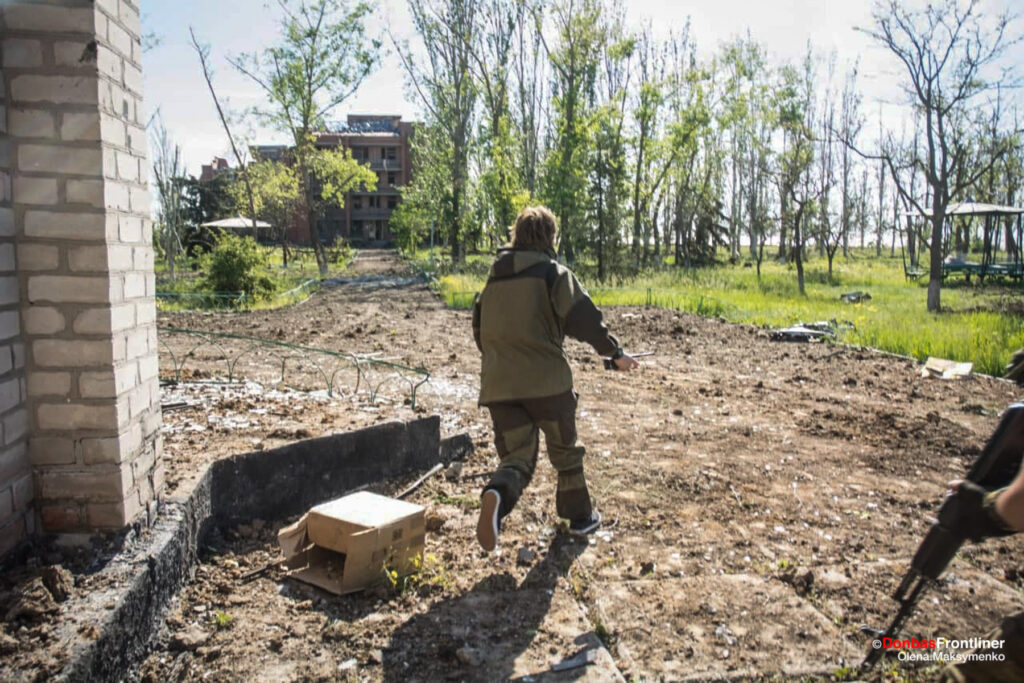
Yana was extremely fortunate to survive a serious car accident in 2015, from which she now uses a wheelchair. However, her injury has not prevented her from remaining active. As she continues to direct the Hospitallers unit, she also serves as a people’s deputy (narodny deputat), i.e., as a member of Ukraine’s parliament, where she is a member of the “European Solidarity” fraction. In parliament, she is also Secretary of the Healthcare Committee. In addition, Yana is a student of two disciplines at once. While she remains enrolled at the medical institute, where she had taken academic leave after the second year of her studies, she is also completing a university degree in political science at a separate institution. She also serves as a processing officer for incoming members’ participation in the volunteer fighting force and is raising her daughter, Bogdana.
We meet with Yana near the Ukrainian Parliament (Verkhovna Rada). As she arrives to us following the conclusion of her parliament session, we have just returned from a trip to the Hospitallers training base and are preparing for an upcoming reporting excursion to eastern Ukraine. Yana is telling us the story of how the name of the battalion came about:
“After the storming and liberation of one village, there was heavy shelling and consequently everyone went to take shelter in basement bunkers. A small group of people, myself included, ran to shelter in one little basement. Among us was a priest. To console those in the basement, he told us a story about the Templars and the Knights Hospitaller. I’ll be honest – this was the first time I had heard about the Hospitallers, but one way or another, I began thinking to myself that if we live to see tomorrow morning, as we hid from a hail of volley after volley of shelling, then I’ll start a medical unit and I’ll call it “Hospitallers”.
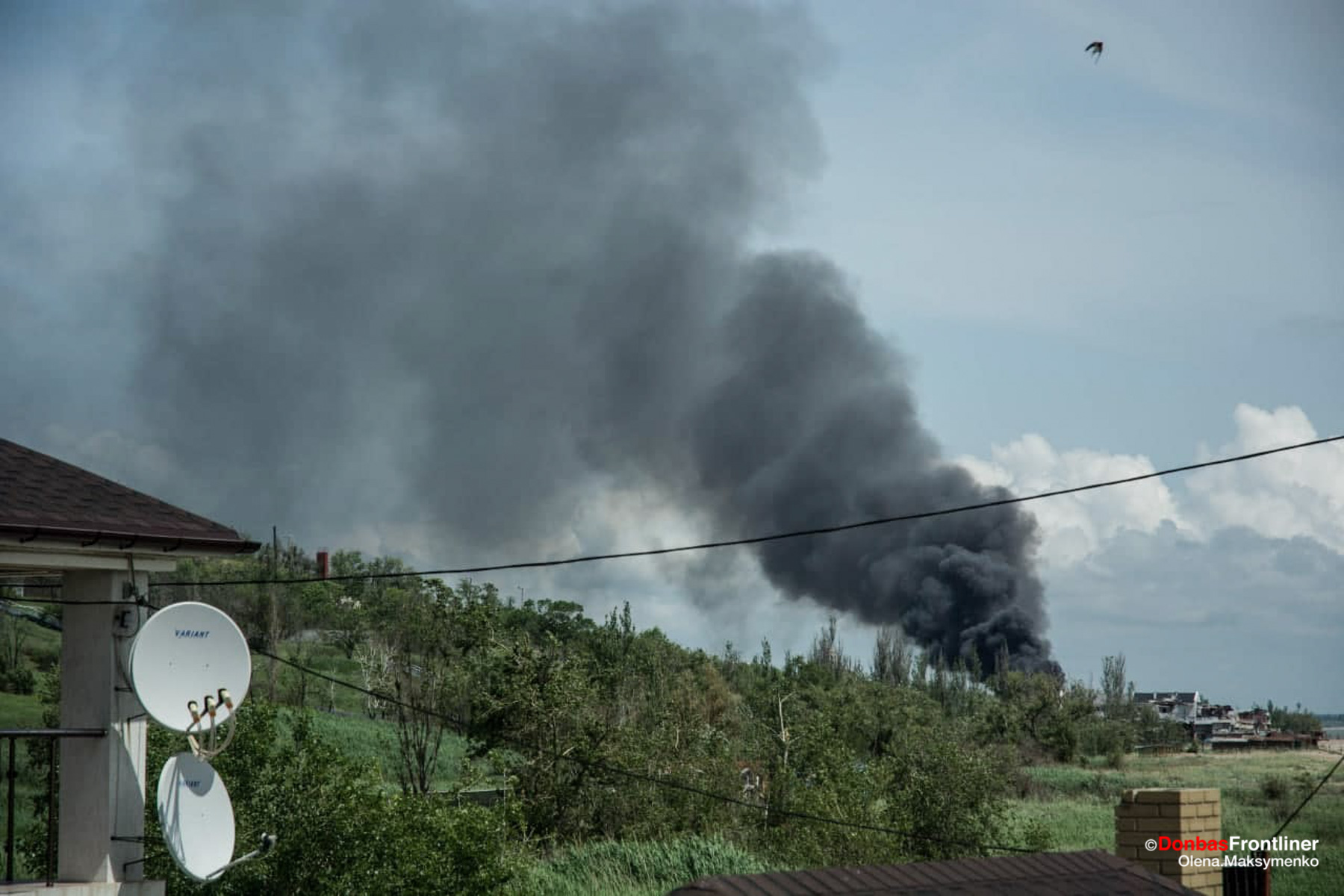
At that time, there was barely a handful of combat paramedics on the battlefront. Yana’s first recruited cohort consisted of people without any prior involvement in medicine, aside from one recruit (a dentist). Later, a medical doctor joined. Since then, there have been several crews trained – crews that, over the years since Yana founded “Hospitallers”, have saved upwards of two thousand lives.
Yana recalls: “I remember the three-hundredth [person saved]. He would probably have survived without my intervention. We were liberating Karlivka. The first attempt [at liberation] was unsuccessful, and it was at that time that someone from our [volunteer combat force] ranks was wounded. Our wounded was a man from Ivano-Frankivsk, he currently has a leadership role in the volunteer corps, and he went by “Tichenky” [little quiet one]. He had sustained a bullet wound in his knee. At that time, we had barely anything of medical means, but we made use of what we had at our disposal to help him. At the very time of those events I concluded, surely, that I would become a medic. After that, Dmitro Yarosh, as our commanding officer, called me to see him. He offered me his combat knife as a gift and said to me, ‘everything will work out for you’”.
Yana’s unit of paramedics was founded on the sixth of July, 2014.
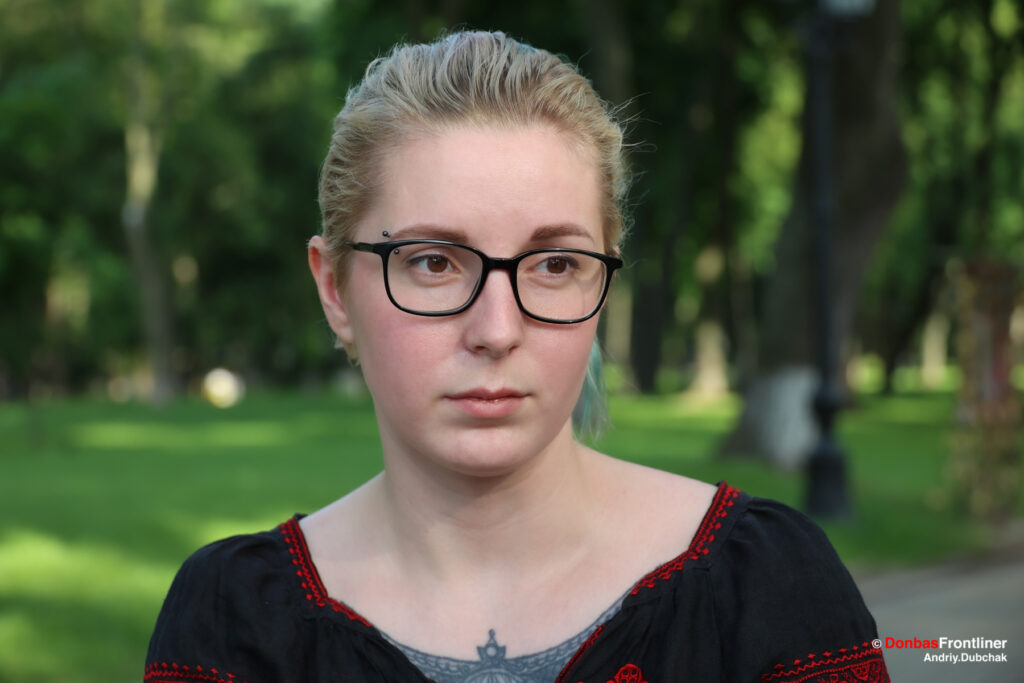
At that time, combatants and medics had neither the equipment nor a single protocol for administering first aid. This initial capacity came to be expanded quickly, “fitted” after the example of tactical medicine achievements in other countries. Various people of diverse backgrounds offered help to the Hospitallers – from businessmen and politicians to shop vendors in eastern Ukraine who, when they began seeing the familiar cadet stripes, brought boxes of water and snacks out of their pantries, saying: “we’ll help in any way we can”. Ukrainians in the worldwide diaspora also offered their help, including acquiring automobiles for the Hospitallers. Zinkevich recalls that the first training camps began in March 2015.
“At that time, all in all, these were our first steps, our first tries. We saw how instructors of other organizations ran trainings, including Patriot Defends, and we understood – it’s all well that they are travelling and training combatants, but our problem is that we have no prepared paramedics. All of our paramedics then were working according to slightly different systems which were absolutely uncoordinated with each other. I understood that at least for myself and my trainees, and for the divisions of Pravy Sektor, there was a need for a unified standard of preparation. Then, at the same time, volunteers started to join us, they simply were arriving in the anti-terrorist operations (ATO) zone in eastern Ukraine, as did combatants of other battalion divisions. With time, the training camp grew to be very professional and high-quality. Now, people who want to serve as paramedics in the Armed Forces of Ukraine will often undergo our training, and our recommendations suit them for further service.”
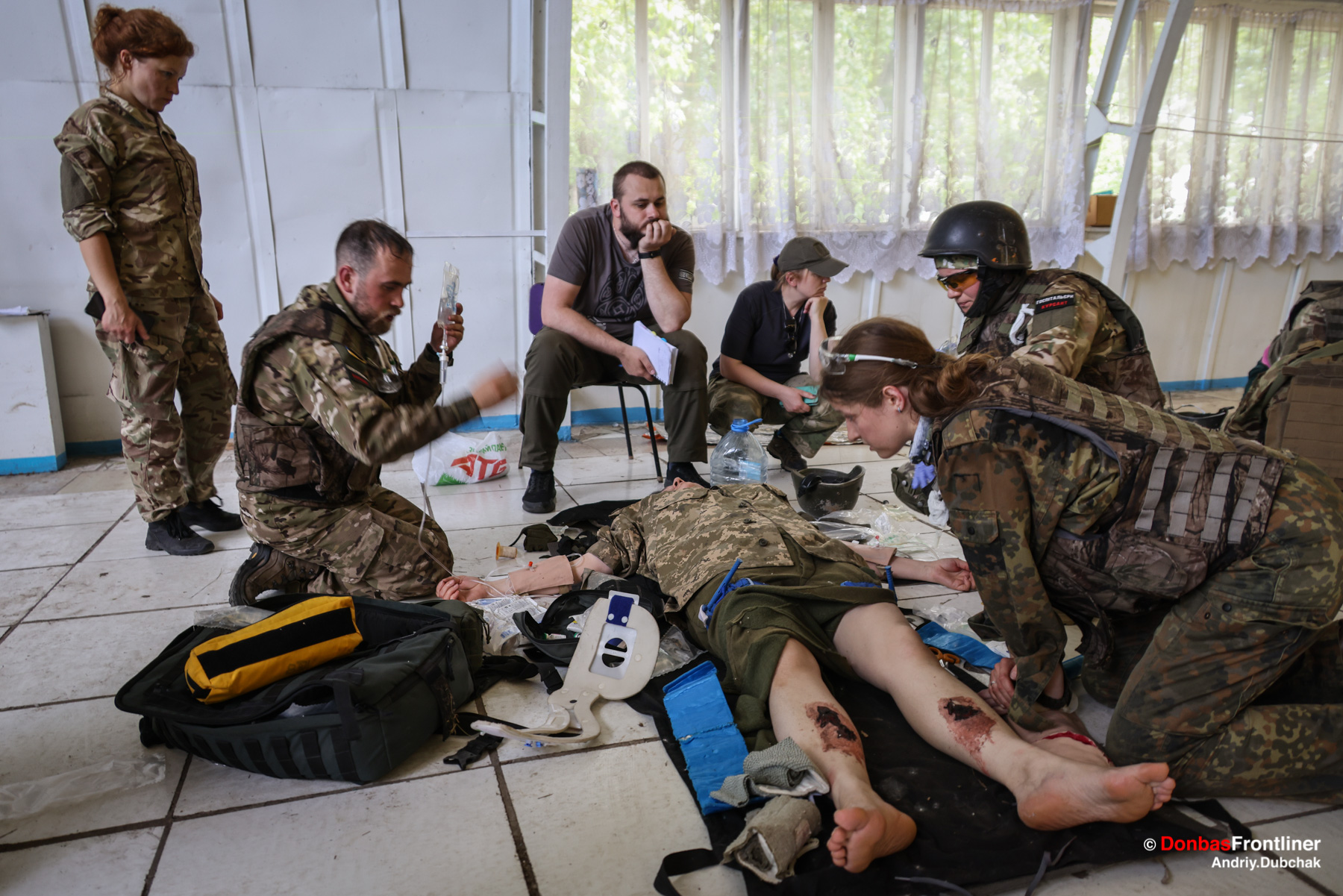
The Hospitallers continue to guard on advanced positions. They also still do not have official status of a combatant as granted by Ukraine’s government. Hospitallers brigade willingly cooperate with volunteer combatants, and Hospitallers can no longer report publicly about their activity in the “hot spots” of the battlefront. This information politics threatens to diminish the scale of support for the Hospitallers – after all, without illustration on social media pages, bright stories of their saving lives remain outside the realm of society’s knowledge. The funds raised to support the trainings barely cover expenses for training material and nourishment of cadets.
The science of rescue
The training lasts a week. It includes theoretical exercises and practice, including, as they are referred to, simulations. These simulations play out combat situations in which the newly arrived cadets must apply the knowledge they have extracted from training in high-stress conditions. At the end of the week, the cadets undergo exams. Upon successful completion of the exam, they each receive a certificate. Nearly two thousand people have completed such week-long trainings.
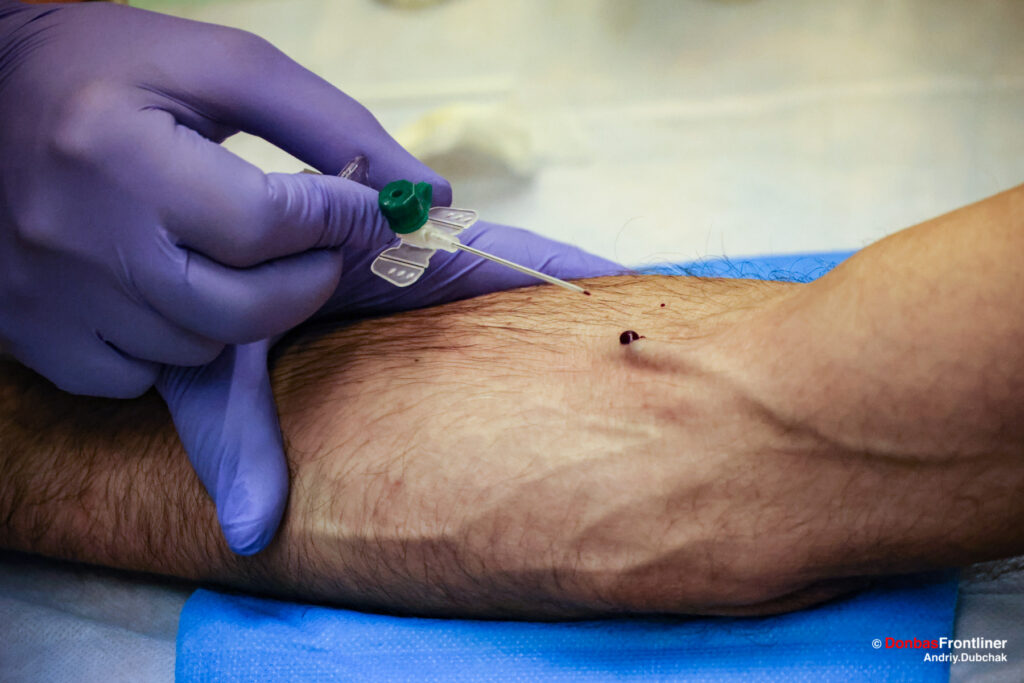
The instructors explain – the certificate does not have legal significance, but it does provide significant credit of trust in different organizational structures.
Some of the cadets have arrived here for a second time – their first attempt to pass the exam was unsuccessful. There are also active military service members undergoing this training. For them, the knowledge captured in the training is critically necessary.
When the cadets first assemble in a line for training, they are asked to think up call signs – until the end, every one of them will call each other only by their pseudonyms.
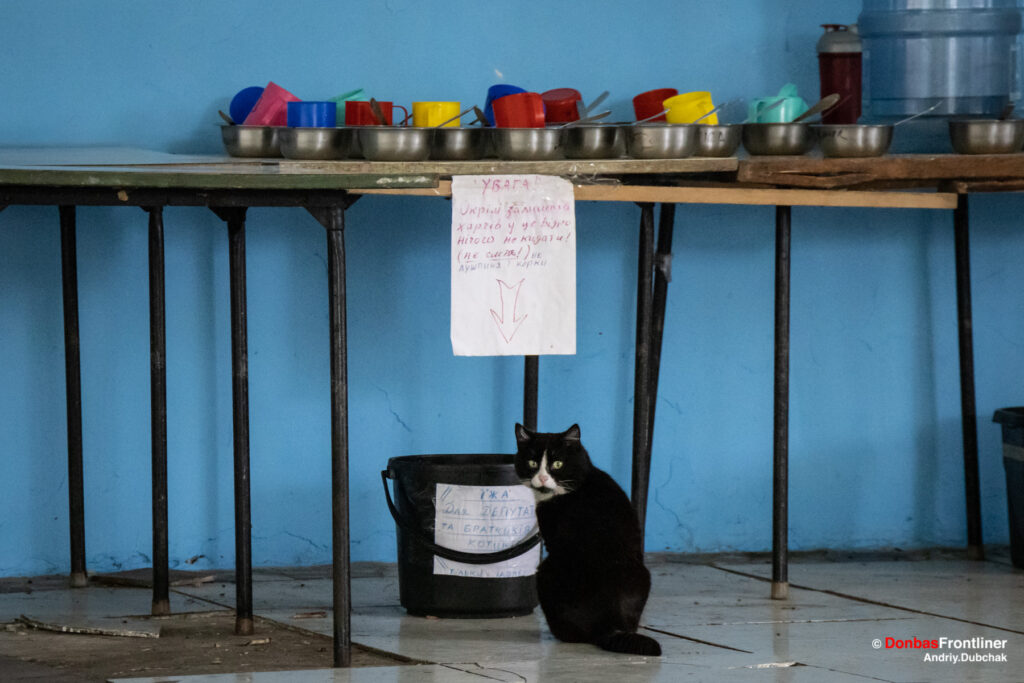
“I want to provide medical care in civilian life, as well as in circumstances of armed combat”, says Dmytro, who has the call-sign “Miller”. “I’m an electrical engineer by profession. I don’t have experience in combat. I’m a little worried.”
“I want to learn how to provide help that can save someone’s life”, explains Nastya, whose pseudonym is “Krocha”. “I plan to sign a contract [to work as a paramedic]”.
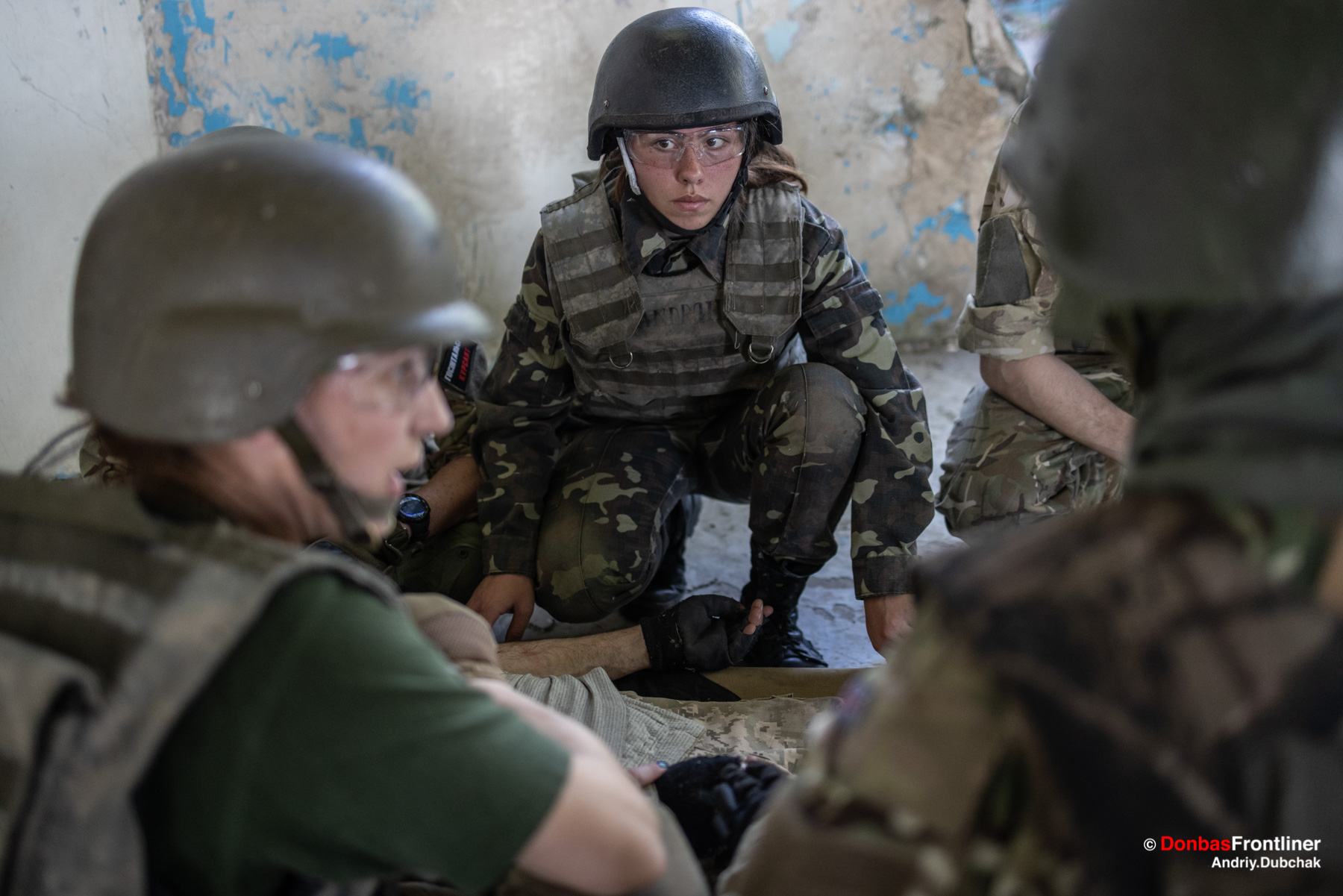
Tata and Valentina, friends with the respective call-signs “June” and “Vuzlyk” are already acquainted with administering medical care. Both are volunteers of the Red Cross. Valentina is studying to be a medic and works as a nurse, while Tata is trained in tactical medicine in the civil society organization “Ukrainian Legion” (Ukrainsky Lehion).
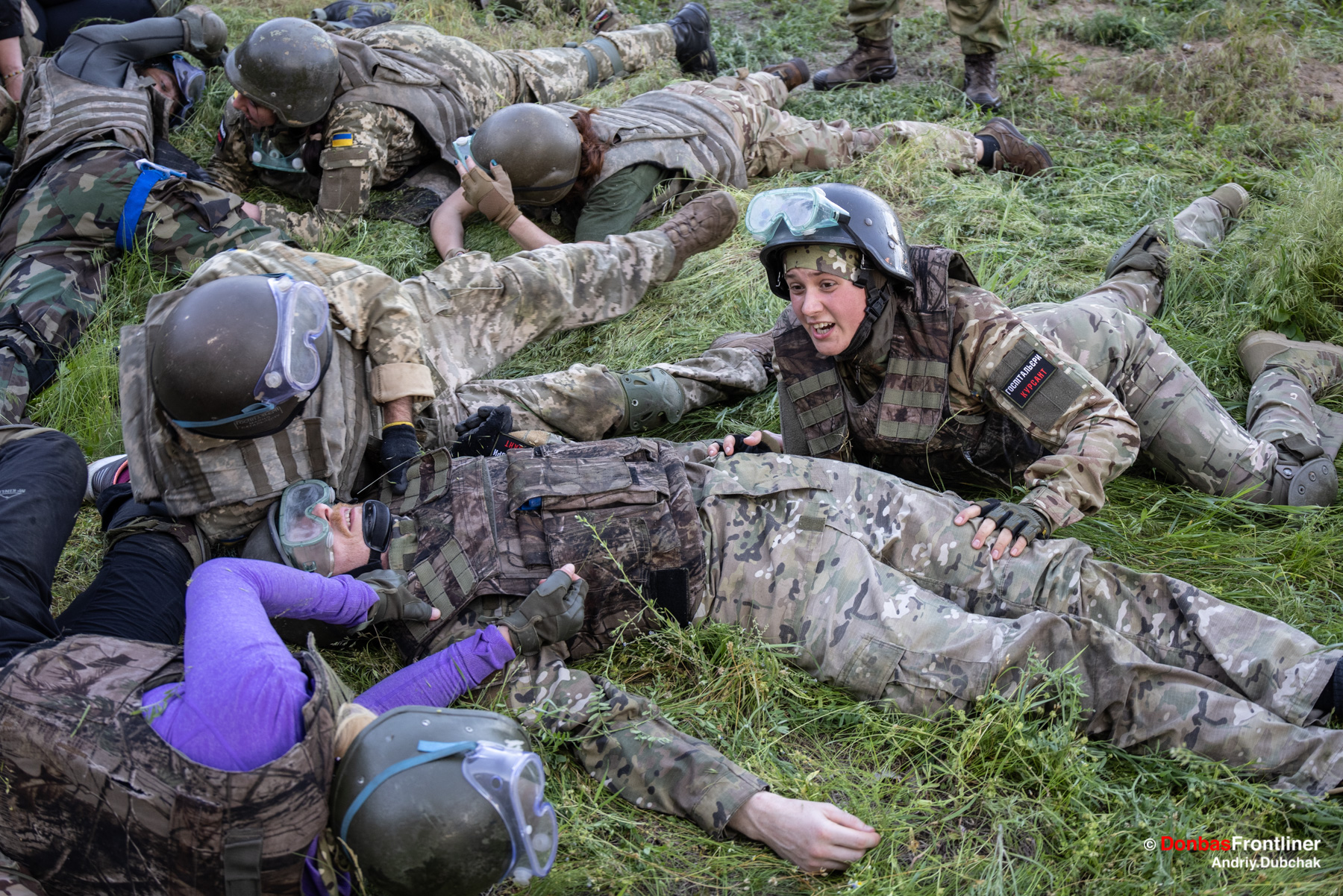
“First and foremost, I want to improve my knowledge of tactical medicine, I’m from the east myself, and I’m very motivated – I want to go to the battlefront to teach tactical medicine to combatants”, Tata tells us. “I want to take on practical skills, I want them to push me to my limits [laughs – redacted]. I want to feel how it is to be in any stressful situations so that down the line, such situations won’t be a novelty to me”.
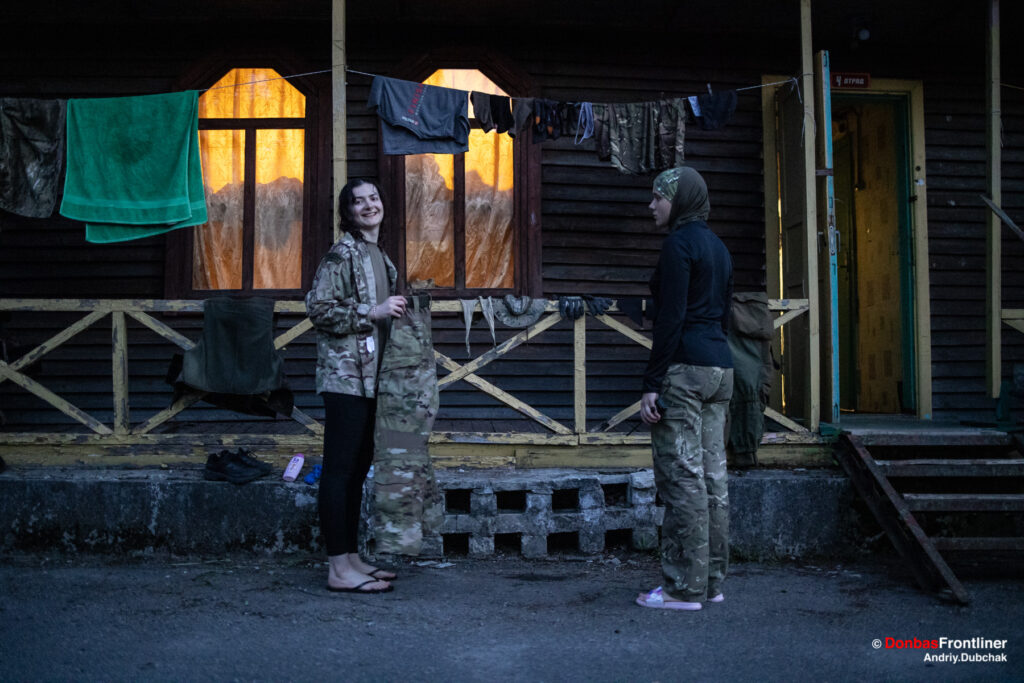
At the time of this article’s publication, Tata has already left on the first front line rotation of the Hospitallers.
Oksana (call-sign “Kalina”), too, is acquainted with the medical field. Truthfully, she admits, she concluded her medical studies a long time ago, in 1997. “I hope to bring my knowledge up to speed a little with today’s medicine, plus I am specifically interested in tactical medicine. I want to find counterparts here, people with whom I am like-minded. In addition to that, I want to test my limits – how much endurance I will have, how much, let’s say, energy will be sufficient for me to study and withstand the physical demands of training. My husband is a combatant, he’s a combat officer. Women in times of war interest me, their role. I’m a Zaporizhian Cossack, I’m studying the psychology of women in combat conditions and the history of female Cossacks.” Mykola “Pisnya” (Ukrainian for “song”) has been living in Mariupol for two years, and the city’s proximity to the battlefront has motivated him to learn about how to function in combat conditions: “If something starts, I need to be able to be useful to society. And in the meantime, completing courses such as these and providing first aid in combat conditions will be the furthest thing from excessive. Plus, I work with teenagers, with youth, there are almost always forty students around me, so for this reason I need to have these skills. I am from Zhytomyr myself, and I’m a history teacher by profession. Now I work in informal education as a mentor.
I’m certain that at the training camp it will be difficult, but I would rather it be difficult, painful, even. Because where there’s pain and hardship, there’s development and growth.”
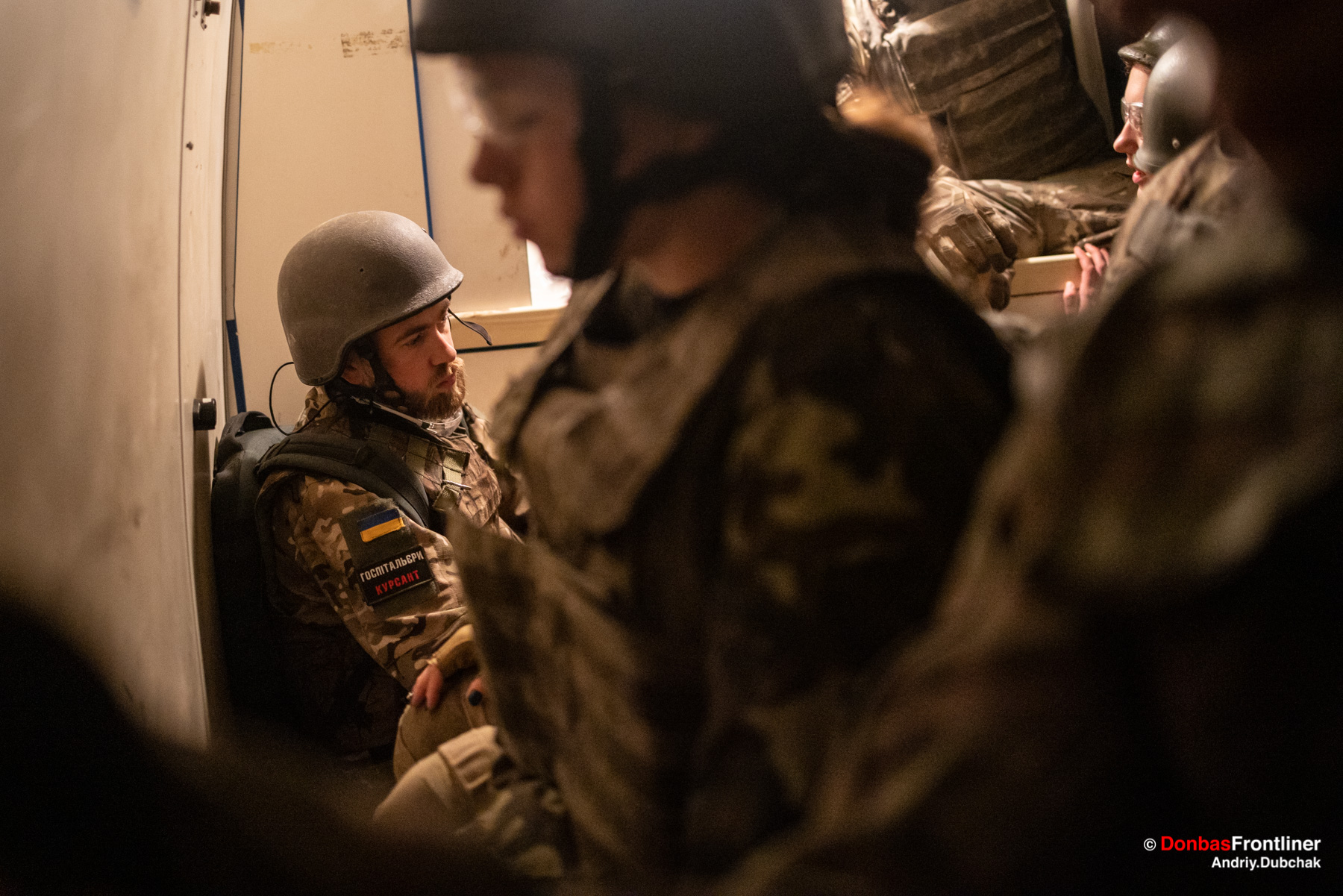
Minus! Minus! Minus! Plus!
It’s one o’clock in the morning. The distinct “amusement”: the piercing signal of the loudspeaker (a repeated version of Beethoven’s Für Elise). The cadets must wake up, and, over the counted minutes, assemble in the full “combat preparation” – in body armor, helmets, protective glasses. The objective: to run through the exercise of placing tourniquets for stopping blood flow. The benchmark: 30 seconds. If the tourniquet is not applied to the wounded individual within that time, critical loss of blood during an actual injury can take an individual’s life.
Apart from music, there are accompanying screams, knocks on doors – all for maximum derailment from comfort, and for approximating the actual stress of combat action.
Through sleep and panic, the cadets hurriedly don clothing and armor. Then comes the assembly, during which the instructor states: “9 minutes to prepare yourself…that’s rubbish! That’s mega-long! That’s before anyone has started out anywhere. That’s only for preparation! Hum, more about that later. Now everyone get the tourniquets out!”
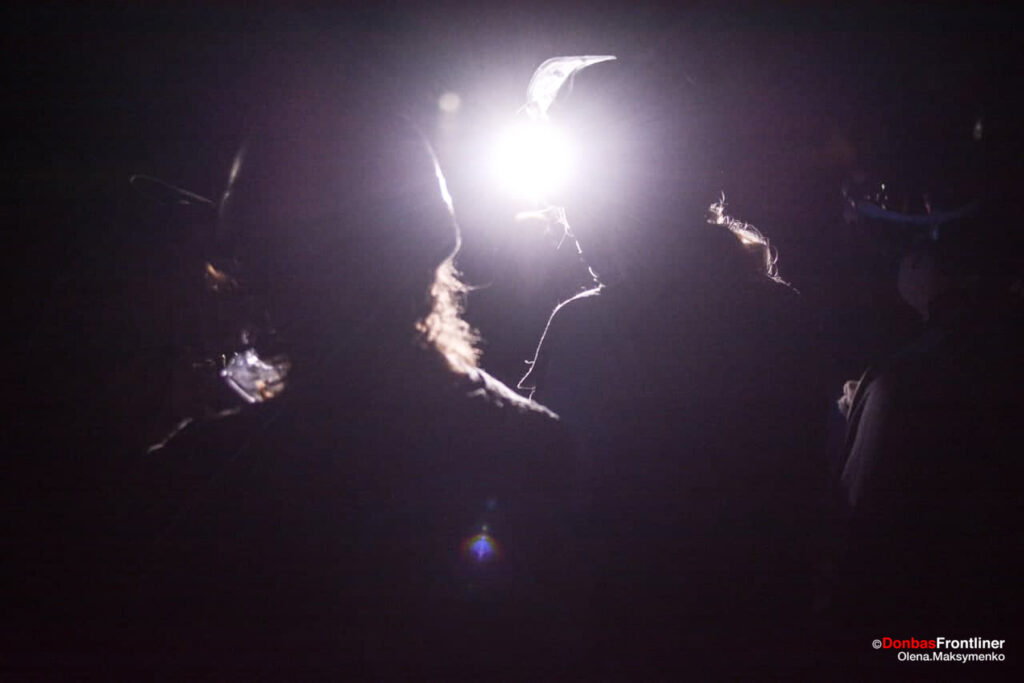
The hour of intense night training is now beginning.
On the count of one sit down, on two get up!
On one sit down, on two get up!
One, sit down – two, get up!
Right knee!
The instructor assesses the quality of the tourniquet adjustments: “Minus! Minus! Minus! Plus!
What follows, as before, are intensive exercises – running and body weight maneuvers such as press-ups – all in full body armor. And, again, following those, cadets lay on tourniquets. Round after round. Amid flashing lights and the coarse sounds of the loudspeaker.
“You’re falling down! You’re falling down! You’re falling down! Thirty seconds have passed!”
The “minuses” of tonight were many times greater in number than the “plusses”.
THE INSTRUCTORS
Also of varied backgrounds are the instructors. Apart from their common position in this civil society role, uniting them is at least some practical experience of mobile, in-the-fields medicine. Ivan (pseudonym “Vano”) is a trained physician, and before the war he ran his own business. Volodya (“Yizhak” – Ukr. “Hedgehog”) is a bioecologist by training who in the past worked in a museum of natural history – as a taxidermist. Kirilo (“Dobry” – Ukr. “Good-hearted”) is a trained psychologist.
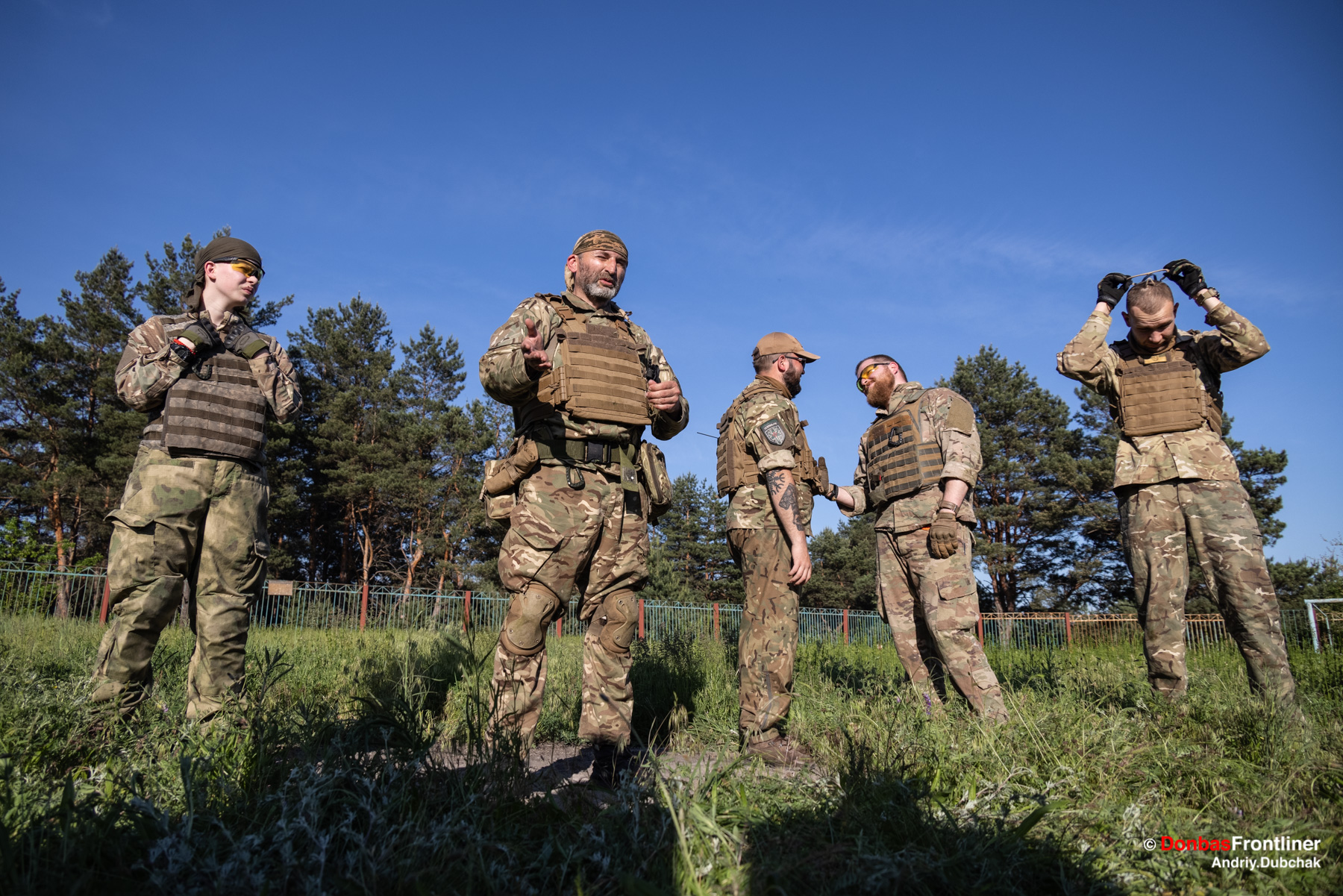
Artem “Sobol”, instructor, as in Yana’s case, did not get to finish medical education – he left his institution once the war broke out, but he relates that he gained skills “in the field”. He has been training cadets for four years already.
“After people complete the training course, they become more collected and more disciplined. Some say: ‘I never worked out in my life before this, but now I’m going to sign up for a gym membership!’. Some find voids within themselves and close these voids. For example, a person realizes that they’re not punctual, and that they don’t know everything. People change for the better. There’s always a positive end to the training, and even those who don’t receive a certificate receive experience.”
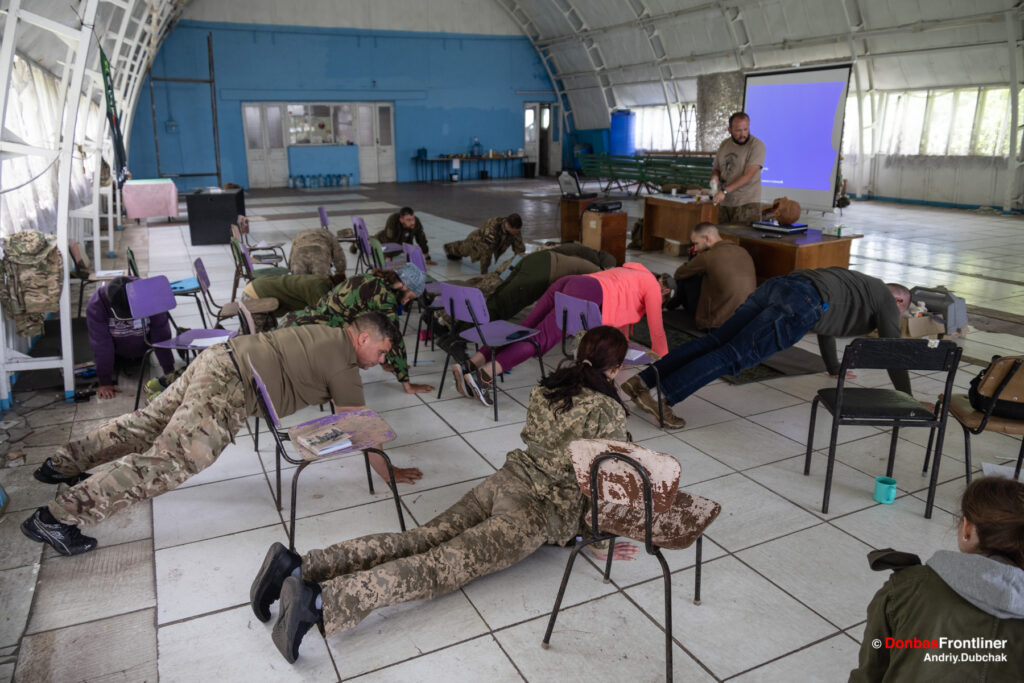
The instructors follow modifications to civil and military protocols for administering medical care. Any and all novel changes are immediately introduced into the program of the training course.
Although the instructors’ favorite subject is tactical medicine, in the Municipal Enterprise “Hospitallers of Dnipro”, instructors also teach civil medicine.
“The project turned out to be fantastic, this is the only municipal enterprise in Ukraine that is in the sphere of training persons to administer first aid”, comments Sobol. “We work according to international protocols, we all hold certification, and work is bustling! Publicly budgeted government structures go through us: the city’s teachers, drivers of trams and trolleybuses, workers of public parks in Dnipro, subway employees, staff of Southern Construction Bureau (KB Pivdenny) – which is a large business, a pillar of the Ukrainian corporate world – they have all requested our training.”
A particular call to action: training ambulatory medics after the declaration of a state of war. “They are excellent specialists – these are people who know civil medicine thoroughly but need an additional, different type of training”, recalls Sobol. “At that time there was a threat of invasion, which has not disappeared at all. But when you arrive, and there’s a surgeon with 30 years of experience sitting…yet after the end of the exercise he approaches you, shakes your hand, and says: ‘Thank you! This was really interesting, I didn’t know any of this’ – it raises the level of the whole operation!”
“GET UP AND GO!”
Mornings begin with warm-ups and runs. Then – assembly, during which a minute of silence is dedicated to lost brothers- and sisters-in-arms.
Cadets are shown a video about the work of Hospitallers, as well as shocking photographs of wounds, burns and other injuries. Paramedics must approach these issues with calm.
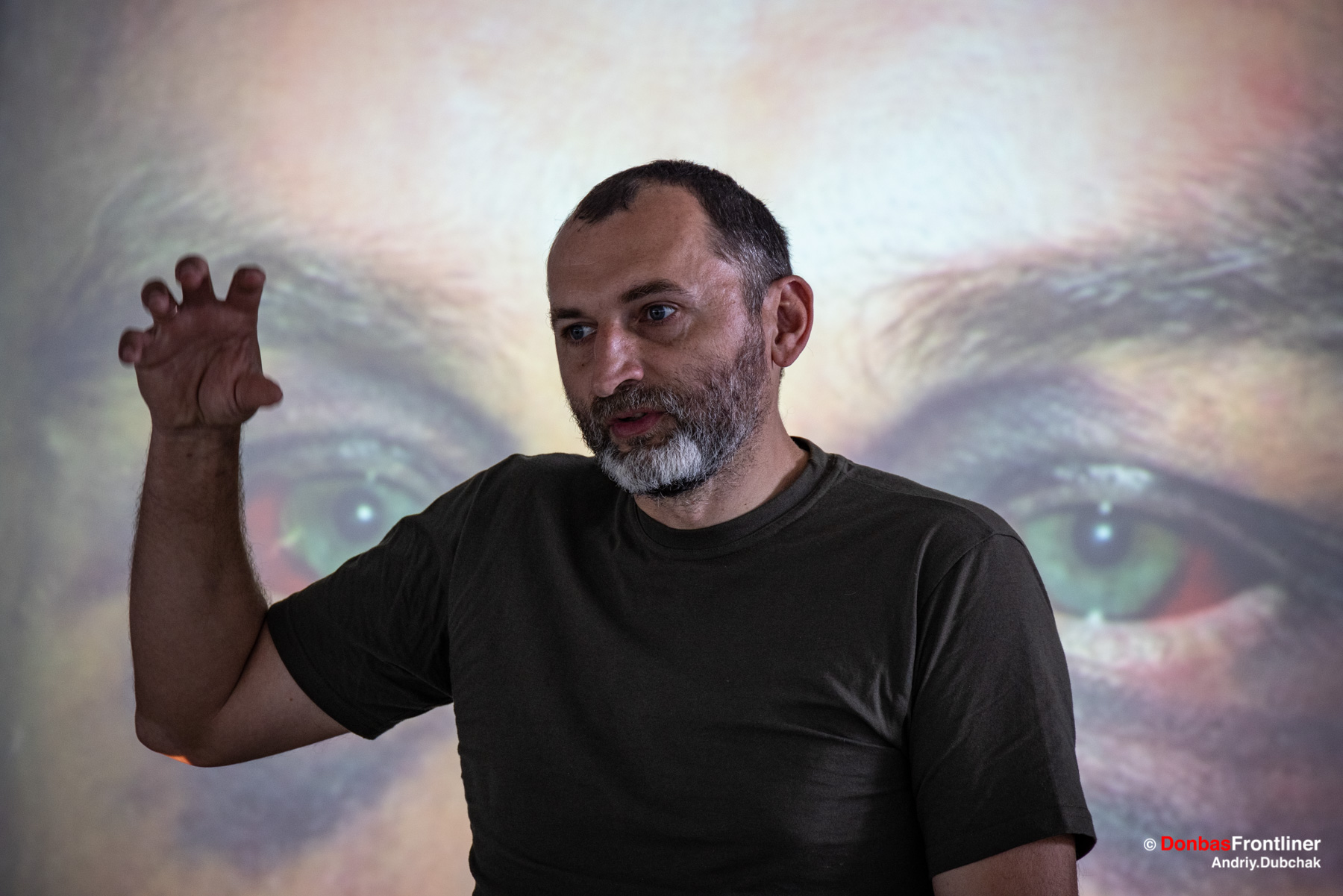
Demanding physical exercises are interspersed with lectures. The difficulty of skills rises with each day of training – from the application of tourniquets to fluid drips and titrating drugs necessary in the case of certain injuries. Injections and catheters are using for training one cadet on another, as well as nasopharyngeal tubes that are administered nasally to the wounded in order to ensure that respiratory airways remain open.
One of the most complex manoeuvres is making an incision to the larynx to gain direct access to a wounded individual’s respiratory airways. Cadets learn to execute this manoeuvre by practicing on pig trachea and skin.
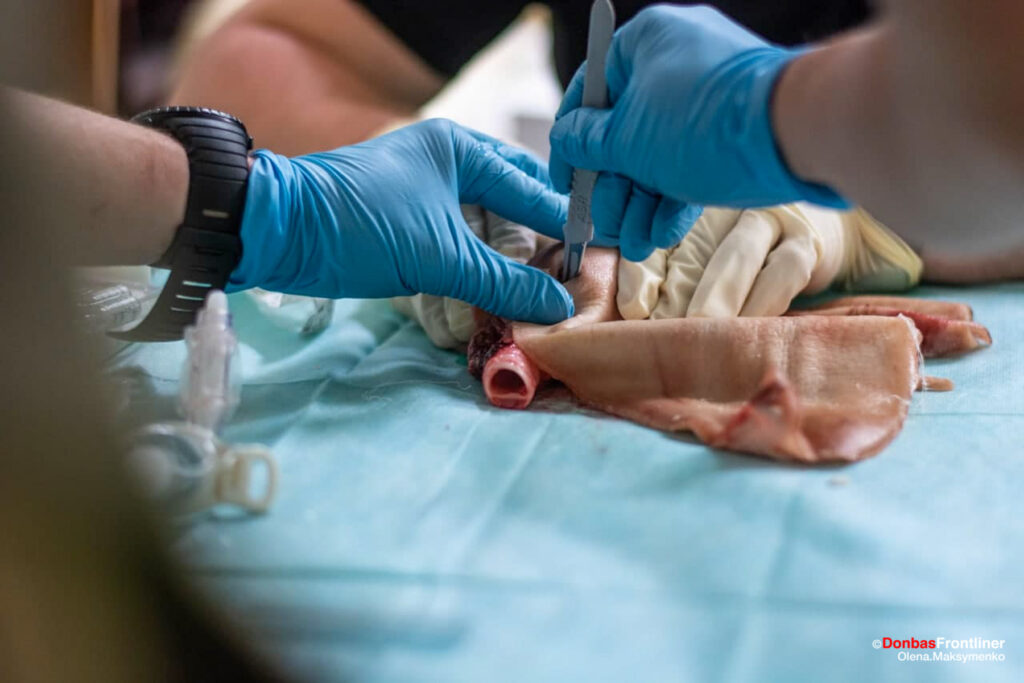
Intraosseous catheter on a specialized mannequin; on the other mannequin there is an exercise underway to stop blood loss. The “blood” will spout out if the “wound” is incorrectly tamped.
The cadets dig trenches, learn how to use rations, how to move by crawling, and how to pull wounded individuals away from the most unexpected locations.
“Explosive technician”, Hospitaller “Bass”, is responsible for organizing the safe but naturalistic “puffs” and smokescreens with which paramedics conceal themselves from “snipers”.
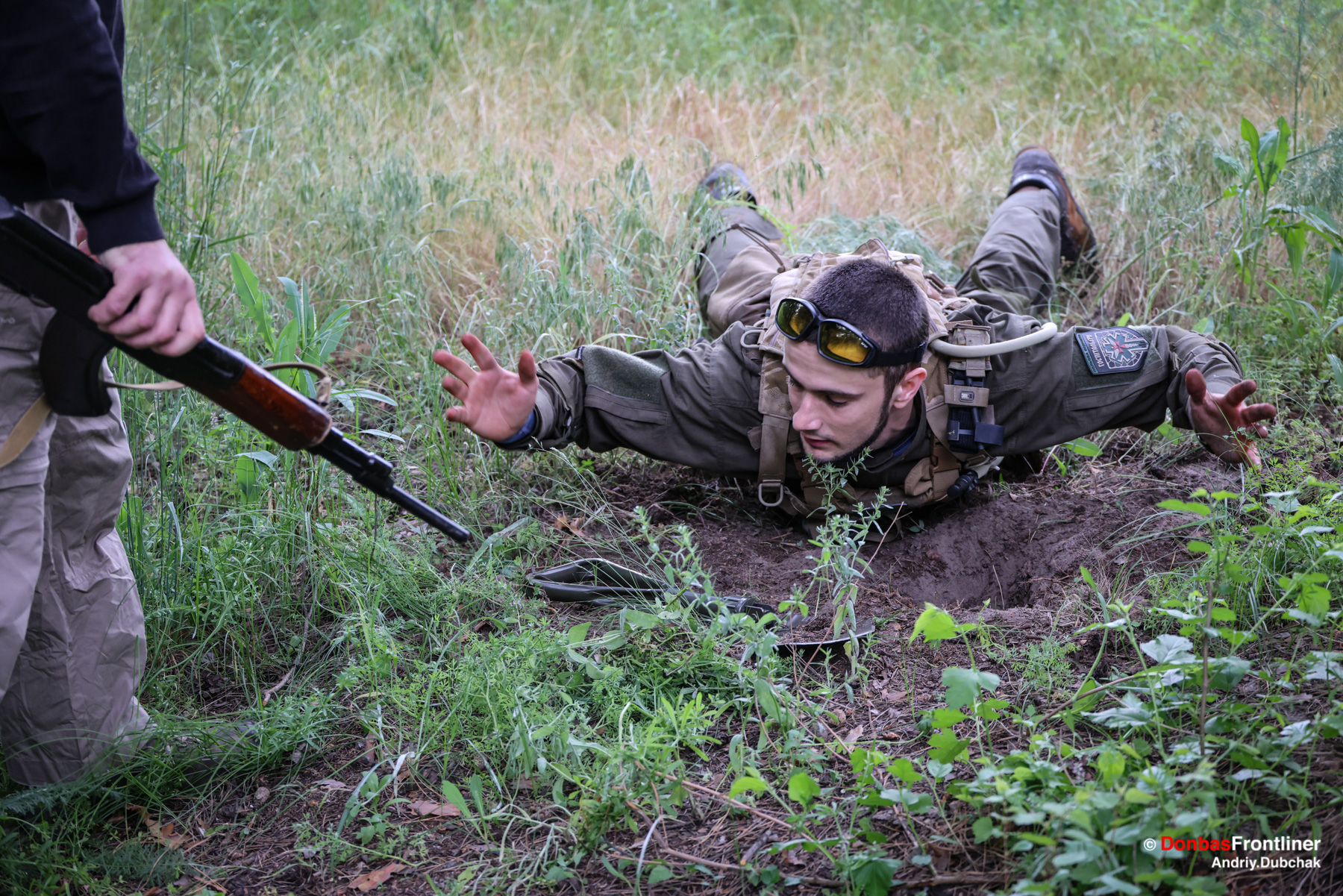
Upon failure of the initial “missions”, the 300 cadets become 200. During the “flight analysis”, instructors tell the stories of wounded people – all of these stories are taken from real situations during the war, and behind each story is the call sign of the rescued combatant. These stories make a thorough impression – the cadets look shocked.
“Yeah, I’m ‘easy’”, a paramedic with the call sign “Dream” says casually, as he recovers three-hundredth place during the exam. He shows the wound that has been glued on his knee and one of his pinky fingers. Behind the fake “bloody rags” it is visible that part of Dream’s finger is indeed missing. In the simulated training, he reproduces this exact wound, which he sustained near the city of Mariinka [in Donetsk Oblast]. He smokes and leans against a tree, awaiting the arrival of “Emergency” assistance with cadets, who have to “save” him.
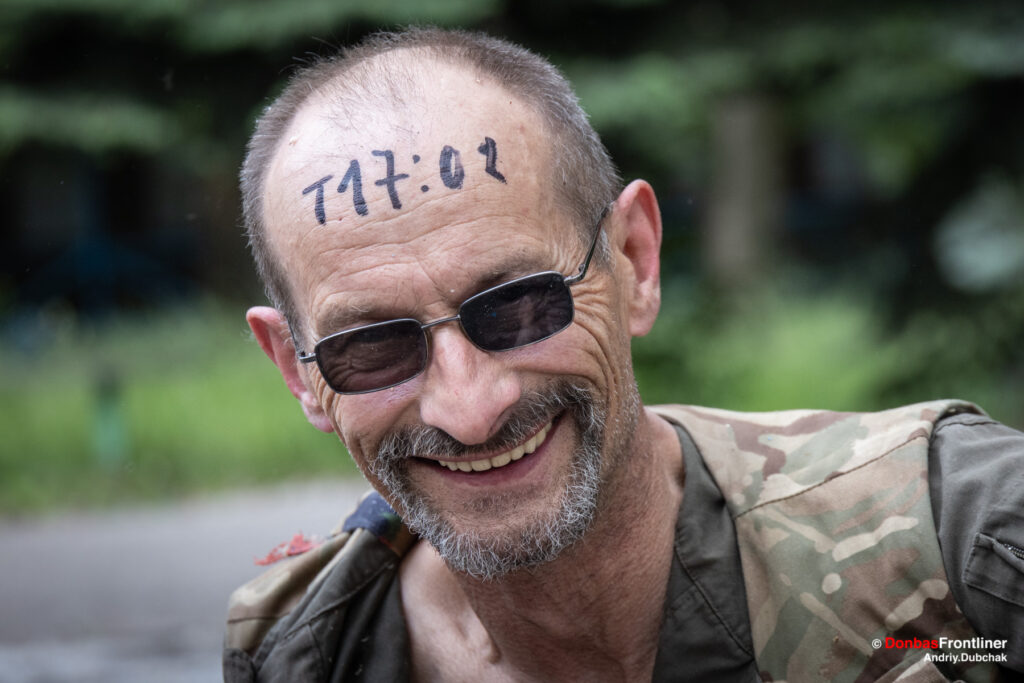
Yizhak explains that sometimes during trainings, it can come to breaking people down psychologically: “There, the ‘crown’ is such, that…people who arrive and are instructors in the structures of other organizations – you respect them only because they agreed to become students. That is, they have taken this step, but not completely. Because there, over the first few days [we’re lecturing them]: ‘Well, I’ll tell you as an instructor…’. Tourniquets – zero [application of blood-stopping tourniquet – red.]. Teamwork – zero. Knowledge – also not thick. Effectiveness of actions – zero. Incorrect actions by a student can, if they become a leader [paramedic in the field] lead to the death of their group and the “three-hundredth [combatant]” whom they have saved, and it can block the work of an adjacent [paramedic] group! So much for your certification?!”
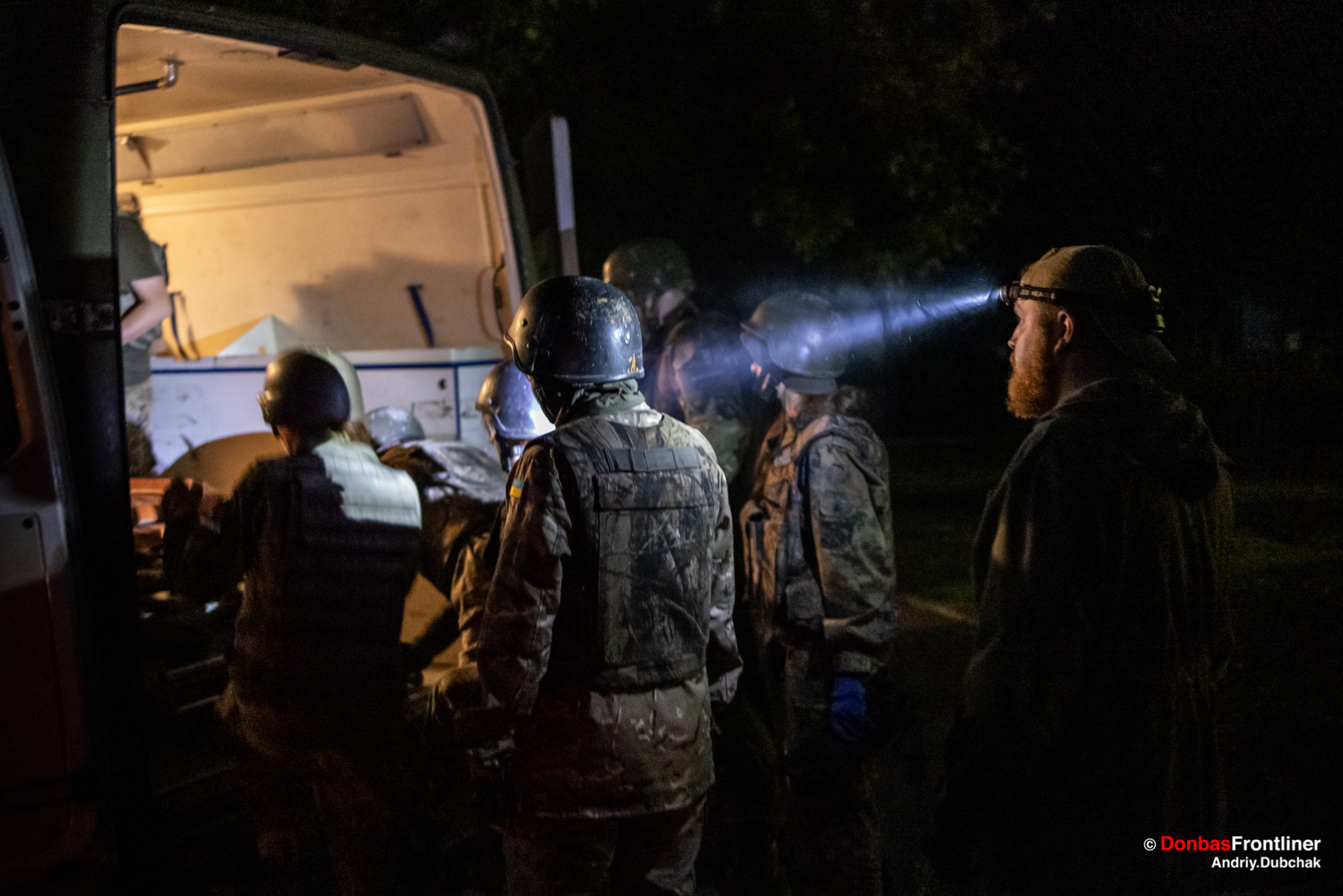
At the trainings there are often also tears shed. The instructors recall that even a fighter from the Ukraine Special Operations Forces cried. “He lay down on the asphalt and said: ‘I can’t anymore!’ recalls Yizhak. ‘It wasn’t even physical, it was psychological! He had already taken part in combat actions, he saw what happens in war, he saw his friends [become] “[the] three-hundredth” to perish, and he saw how paramedics work, but he was not in their role. [In the paramedic training] he began to understand how costly the most minimal mistake of a paramedic can be. Hysteria – he overcame himself, he went away for a short period, and on the second day he locked himself in – he began to work.”
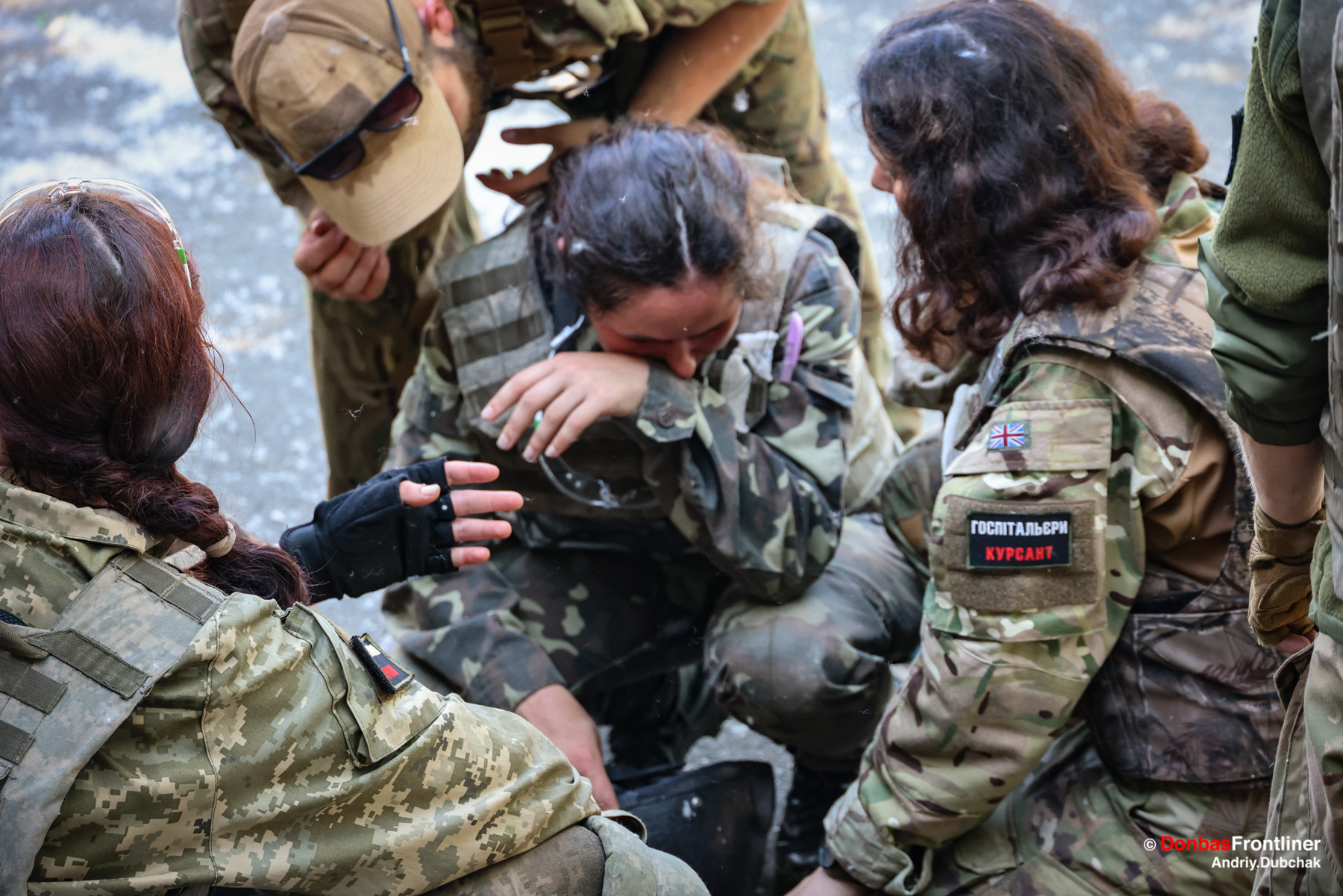
“Medicine catastrophe – a bunch of years’ worth of experience, work experiences in urgent care – it seems as though a person has seen it all…[then] arrives a car with the “three-hundredth” [fallen combatant], and it starts: stupor, growling – they lean up against a wall, they faint…this person can’t work. ‘Breathe out! Stop yourself! We’re working onward!’/ ‘Whew…’ – and we’ve started working again.”
“All of you, look – at the beginning of the war, some were with the ‘crown’, and some were ‘quiet-quiet’”, comments Sobol. “But now this ‘quiet one’ is working normally! And the ones who were, so to speak, wearing the ‘crown’ – the ‘crown’ fell off, and they are working well! Today everyone was under the same conditions, and all of them worked superbly! At the end of the training it will already be completely different, and even those who had the ‘crown’ will not want to put it back on. They understand their strength now, that alone they are nobody here. We teach with ‘whip and gingerbread’. They were ‘killing’ people in tactical practice. Simply confusing dosages and so on. They have understood that they don’t know everything. Even those who had thought they knew everything! The same goes for physical exercises – a guy pulls and pulls, and says: “I’ve run marathons – that’s it, I can’t anymore…how is that the case?’”
Particularly complicated is the task of working with professional doctors, as they perceive training from a medical point of view. Despite enormous amounts of experience and irreplaceability in hospital settings, they are absolutely defenseless “in the field”. The “collective” joke of the Hospitallers – all that a paramedic touches becomes sterile.
The Hospitallers are continuously training and learning. In parallel with training cadets, there is an ongoing “qualification-raising course” for active paramedics, as skills must be constantly refined and improved.
“Get up and go!” the Hospitallers say, as per the biblical allusion, to the successfully “rescued” paramedic-chaplain with the call sign “Lazar”.
COOLER THAN HOLLYWOOD
During the training there are several strict “taboos” in place: on alcohol, sex, and conversations about politics and religion. The “punishment” for breaking these taboos: physical exercises.
Collective responsibility and teamwork are infused into the group by this same method. As such, if one person is late to the assembly, all the rest are to wait for him or her by lying completely prone to the ground [including the ankles touching the ground]. Contemplating the “hardships and deprivations” of the cadets is Pavlivna, the favorite cook of the Hospitallers, who is now pulling on a cigarette.
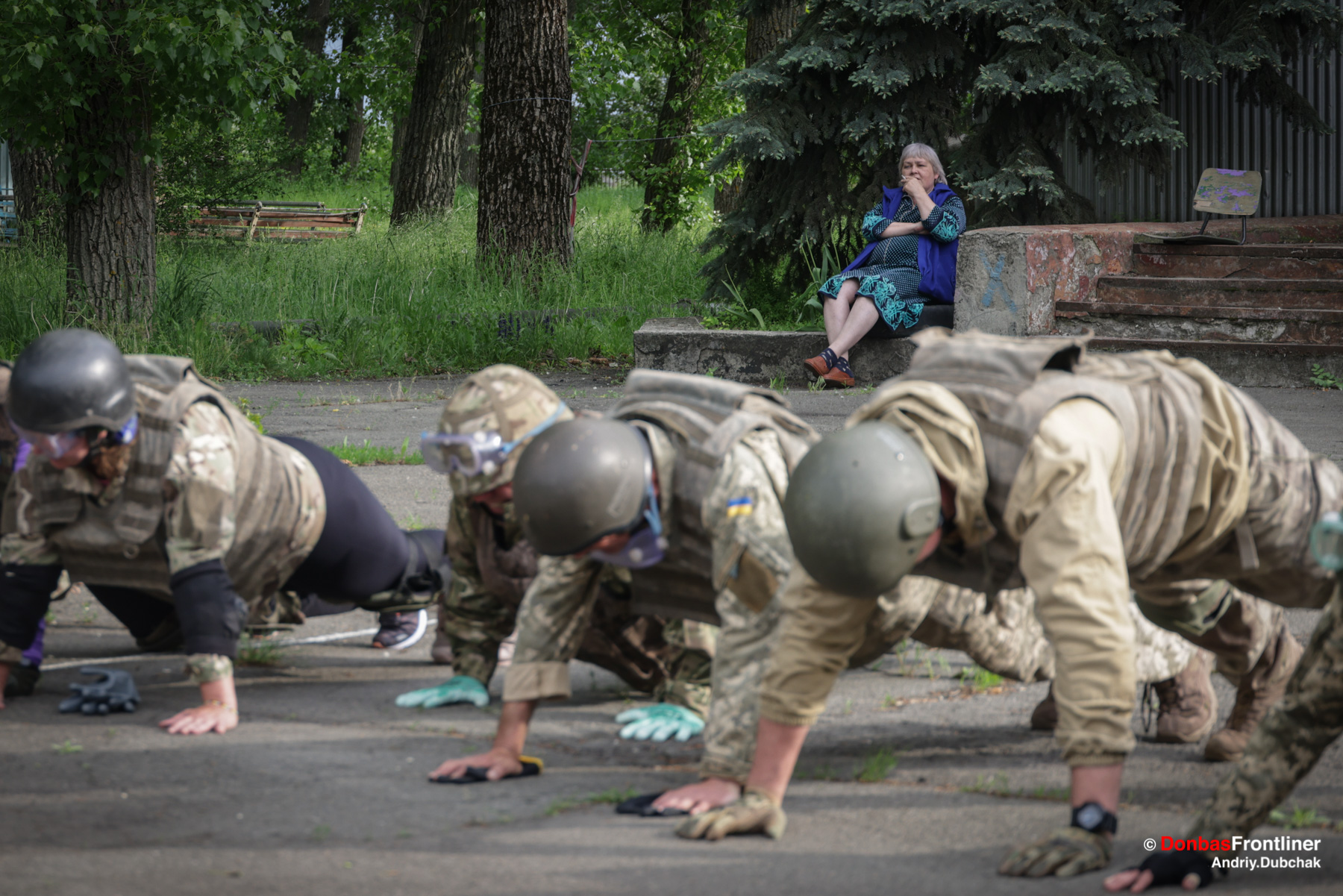
Cats come running to the fore at the call of “Kovid” and “Fignya”. Behind the fence, with a bark, rustles the dog “Deputat” – during the trainings he sits chained, however in the absence of cadets, he runs freely around the territory of the base and works as a security dog.
The program of trainings remains unchanged, irrespective of weather conditions. “We had a March training in the year before last – there was snow, minus-3 degrees Celsius, and people come out, press themselves down on the snow, they’re crawling…” Yizhak recalls. “Some snow melted and froze again – everything was covered in ice. And that led people to break the ice with their elbows, to crawl and cling to any breaks. There were moments when everything had melted away, but we had a night wake-up. People went outside at night, when everything was wet, some ran out in slippers, snow, mush – but they do everything [asked of them]! They have a real stimulation to do this! And, by the devil, how they change! For me each time it’s mystifying how people change. You arrive the first day and look at them – it’s not the same people! You leave here – you’re already with them as if you were with family!”
Each training receives a different name. This training has been given the name of “Forces of Random Operation”, the one before it: “No Promises, No Excuses”. After the trainings, participants create group chats on social media sites, and interaction sometimes lasts years.
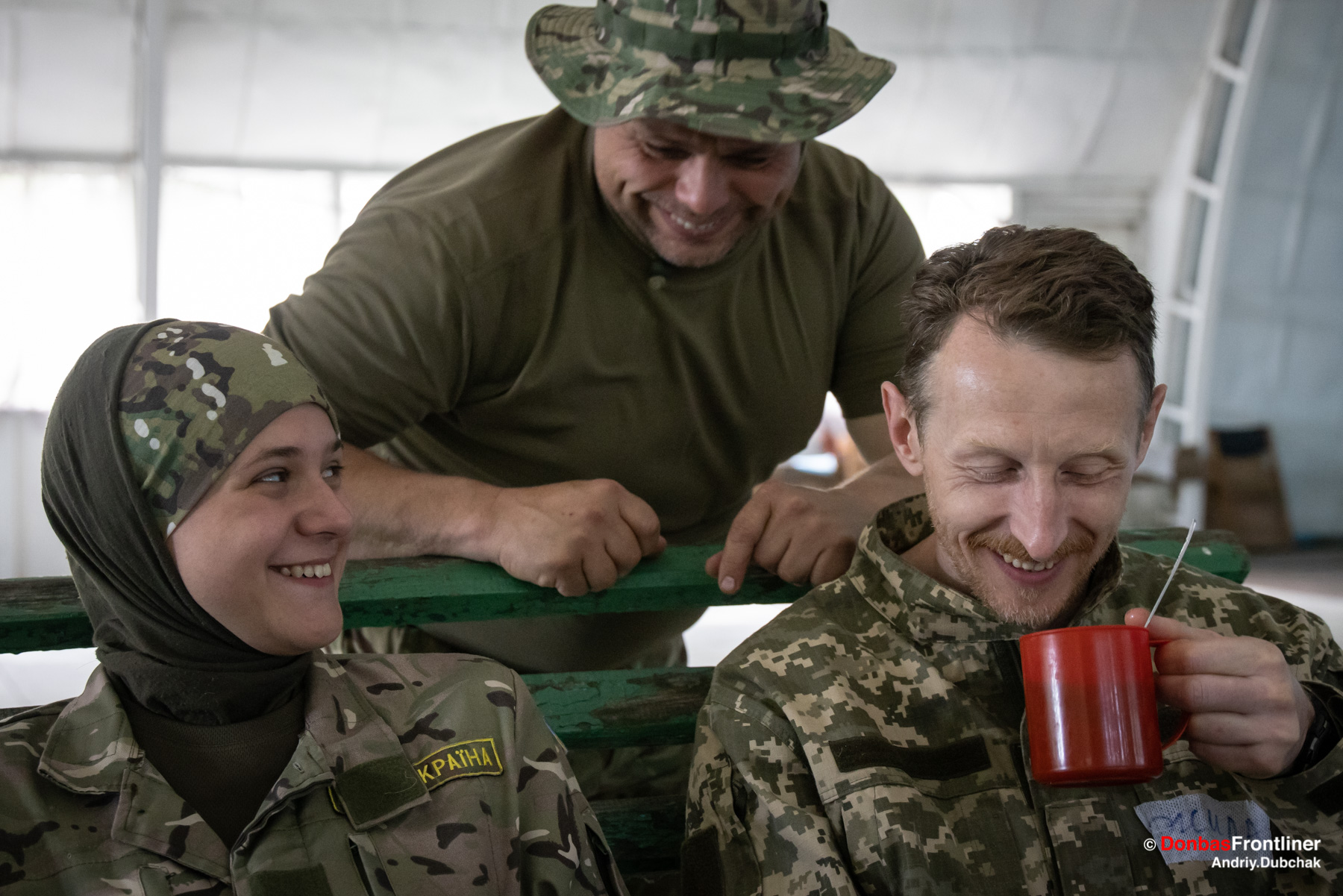
“Someone in some city – let’s call each other, let’s meet up!” says Yizhak. “In whichever city you go to – someone from the trainings meets you, takes you out, gives you a place to spend the night…it’s great!”
“You can’t stop coming here!” says Dobry. “You want to go on rotations here. The only vacation you take is to come to training – and you’re already thinking about taking more time off from work, switching shifts with someone, to come here! Despite the fact that you don’t get sleep here, you’re doing a bunch of everything and running around, you’re happy – you think: ‘Damn, I want more of this!’ You reset your knowledge base, you recall the old…it’s just great!”
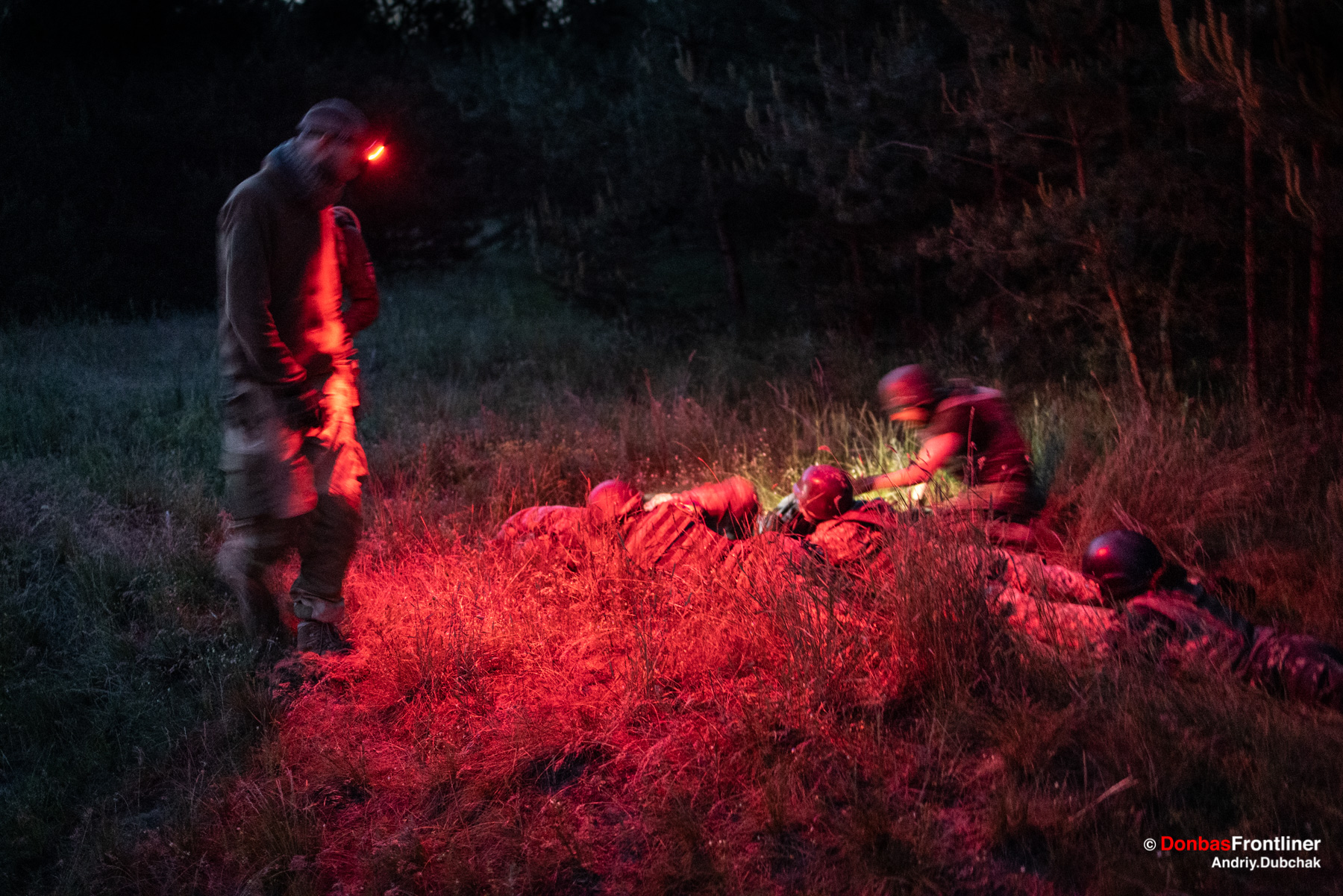
In the evening after the final exam, there is a good-bye party with shashlik and film viewing. The next morning, there’s the “moment of truth” – the handing out of certificates to those who have taken the exam and succeeded. The instructors drag out the intrigue until the last possible moment, reminding those present that not all will receive certificates. A few of the cadets are demonstrably unsettled as the instructors say: we’ve printed on all the certificates, now we’re going to eliminate the superfluous ones. However, one after the other, all cadets receive the documents of merit [certificates – redacted].
“As we were saying, not all here received certificates – the instructors are again left without certificates!” – the instructors mockingly interject.
The last step is an interview with all the newly-certified cadets who wish to join a battalion and go on rotation. Of the seventeen cadets, sixteen want to try themselves as a Hospitallers paramedic. “I’m in shock!” – Arsene (call-sign “Orest”) says as he shares his impressions with us. “The instructors are great, because to get into the heads of adults and make them really stretch themselves – it requires a close knowledge of human nature. We’re watching Hollywood films, and from the tenth minute we understand what’s going to happen in the end. In 95 percent of films. That 5 percent of films capable of surprising us, it’s fantastic! In this way the courses are wonderful, because you don’t know what to expect, even if you think you do know. A bow to the ground and a thank-you to the organizers, this is just fantastic!”
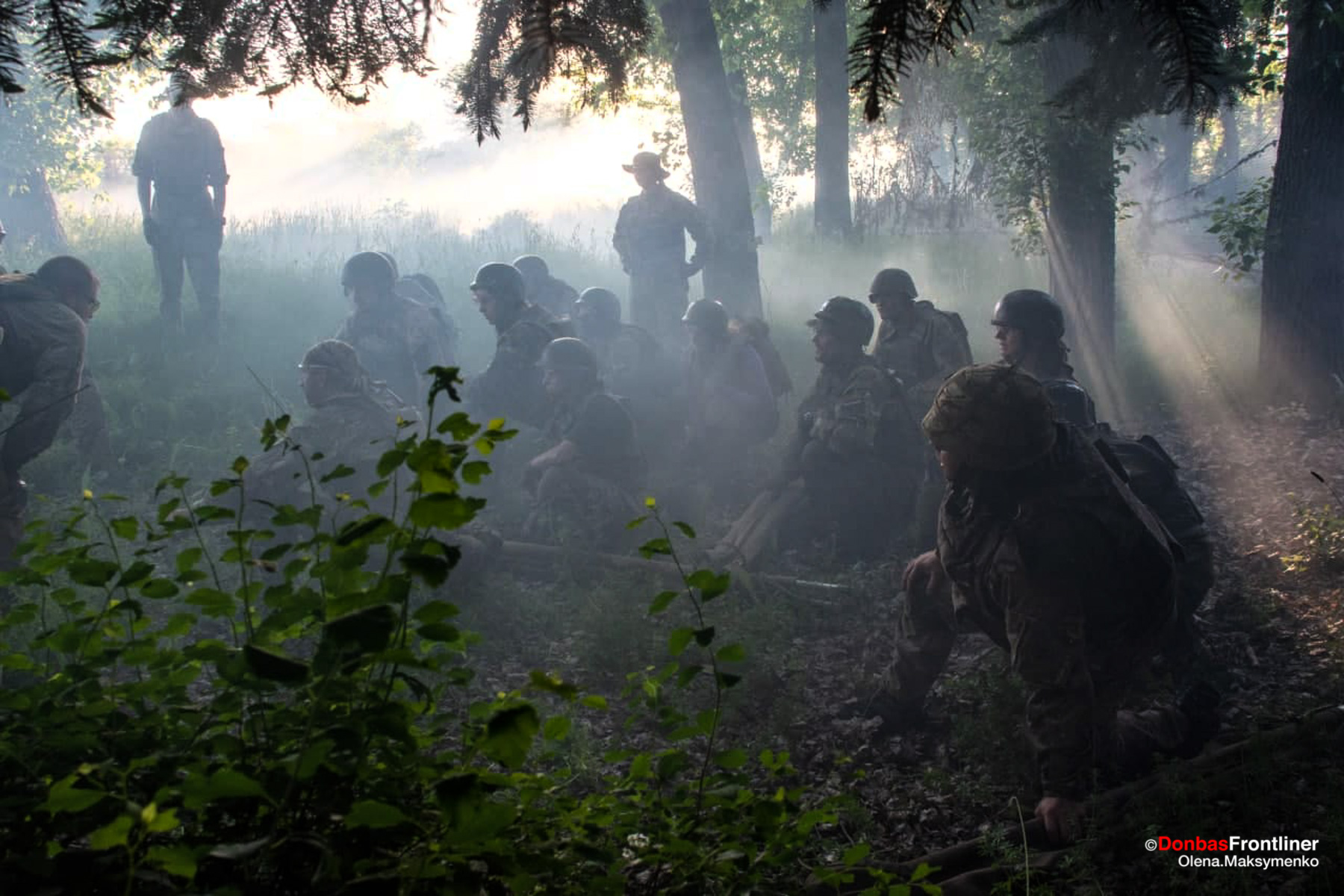
Arsene works in mountain tourism, therefore he’s as well-acquainted as can be with the danger of injuries. He admits – during the trainings, there were physically unpleasant moments and moments of doubt:
“It was very difficult at night after certain trainings, when you’re lying down and you’re thinking, do you need all of this, will you make it through physically? For this, I give particular thanks to the organizers, because when they poke you in the nose and they challenge your motivation, very poignantly at that, they don’t pose direct questions to you, they don’t demand answers from you. They just deal with you so that you have an internal dialogue with yourself. I thought to myself, do you really need this? Are you ready to put yourself in these certain situations? Are you ready to take this responsibility? The answer isn’t important to anyone but yourself. That is all to say that it was difficult, but very instructive – I thank you!”
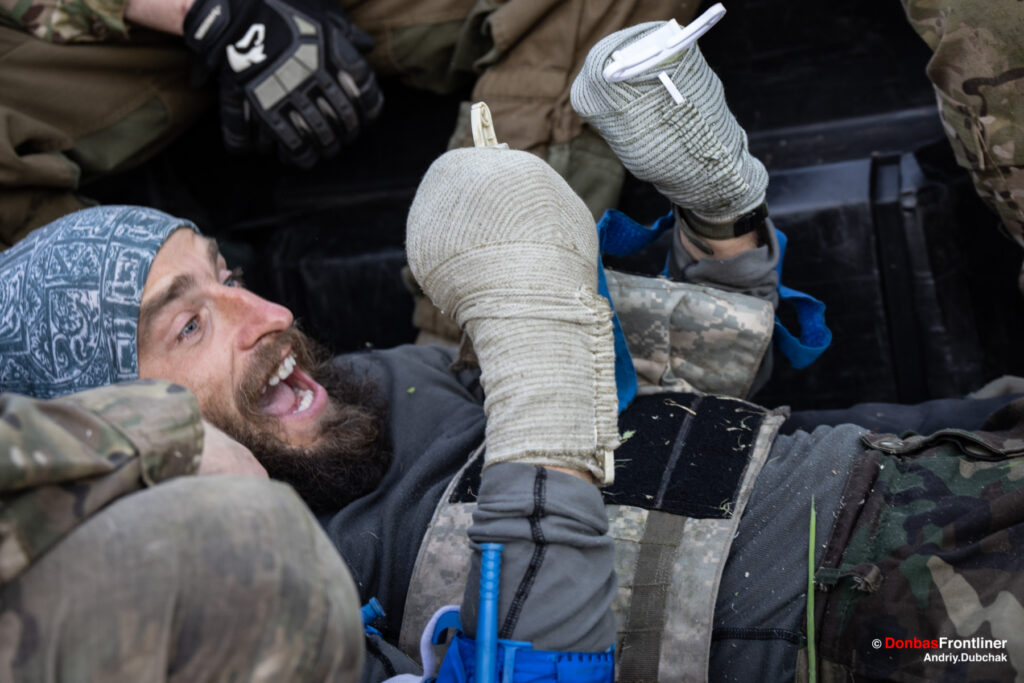
Cynologist Olena (call sign “Karma”), on the other hand, expected the course to be more difficult than it actually was – both emotionally and physically. “However, nevertheless, each one of us took away something important personally”, she says. “We proved to ourselves how our minds will work in a critical situation, how we will be able to collect ourselves, if we will be able to organize people around us, what our role will be in general in such a situation, as this situation can come up, not only in war. And each one of us drew out certain information for ourselves. About ourselves. And honestly speaking, apart from those, who will go to join the battalion, who will be working from nil, may God not have anyone need to use the knowledge we’ve gained here!”
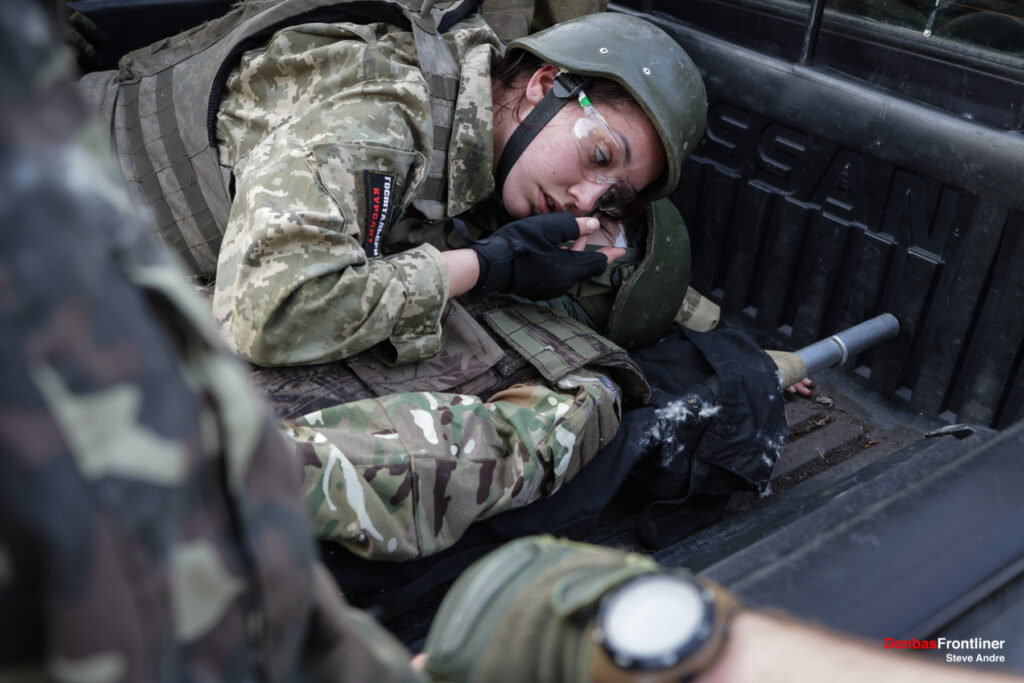
“It’s very difficult to understand what to expect at all, because here there are constantly “little surprises”, there are constantly new things falling into focus”, Vuzlyk comments in respect to his experience. “It’s actually about more than testing yourself. I thought for some reason that I won’t be able to do it, that it will be more difficult. I’m pleasantly surprised with myself!”
While Vuzlyk was working as a nurse and volunteer at the Red Cross in days past, she came to know about the first aid process. However, the work of the Hospitallers instructors appealed to her: “It’s very impressive that the guys give all first aid under compression, in a detailed way, and without water. I don’t know how it is elsewhere, but everything they taught crystallized in my mind very quickly and compactly. Some excerpts of knowledge became a permanent part of my system. I really appreciated the relationship of the instructors and sub-instructors toward the cadets. They make you stress yourself, but they do this – I don’t know, whether with love, but certainly with respect. At training I felt not even once that they acted oppressively, put excessive pressure on me, or put themselves on a pedestal above me. This is a very important attitude, and I’m very satisfied by it.”
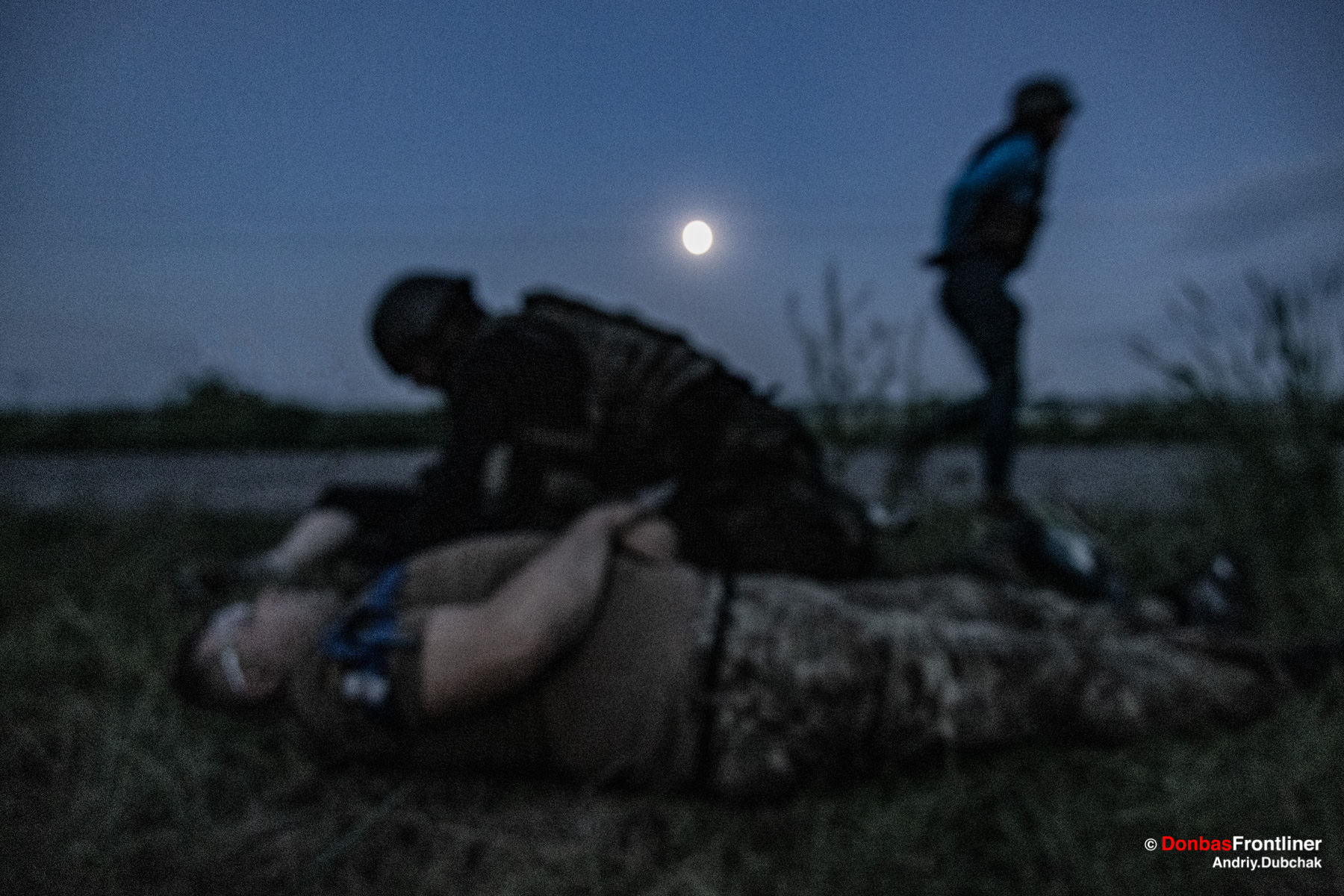
Hospitaller trainings take place every month, details can be found on the Facebook page of the battalion.
To the question of whom would be advised to join the battalion, Vuzlyk replied: “Let’s be honest: we live in Ukraine in 2021. It’s necessary for all!”
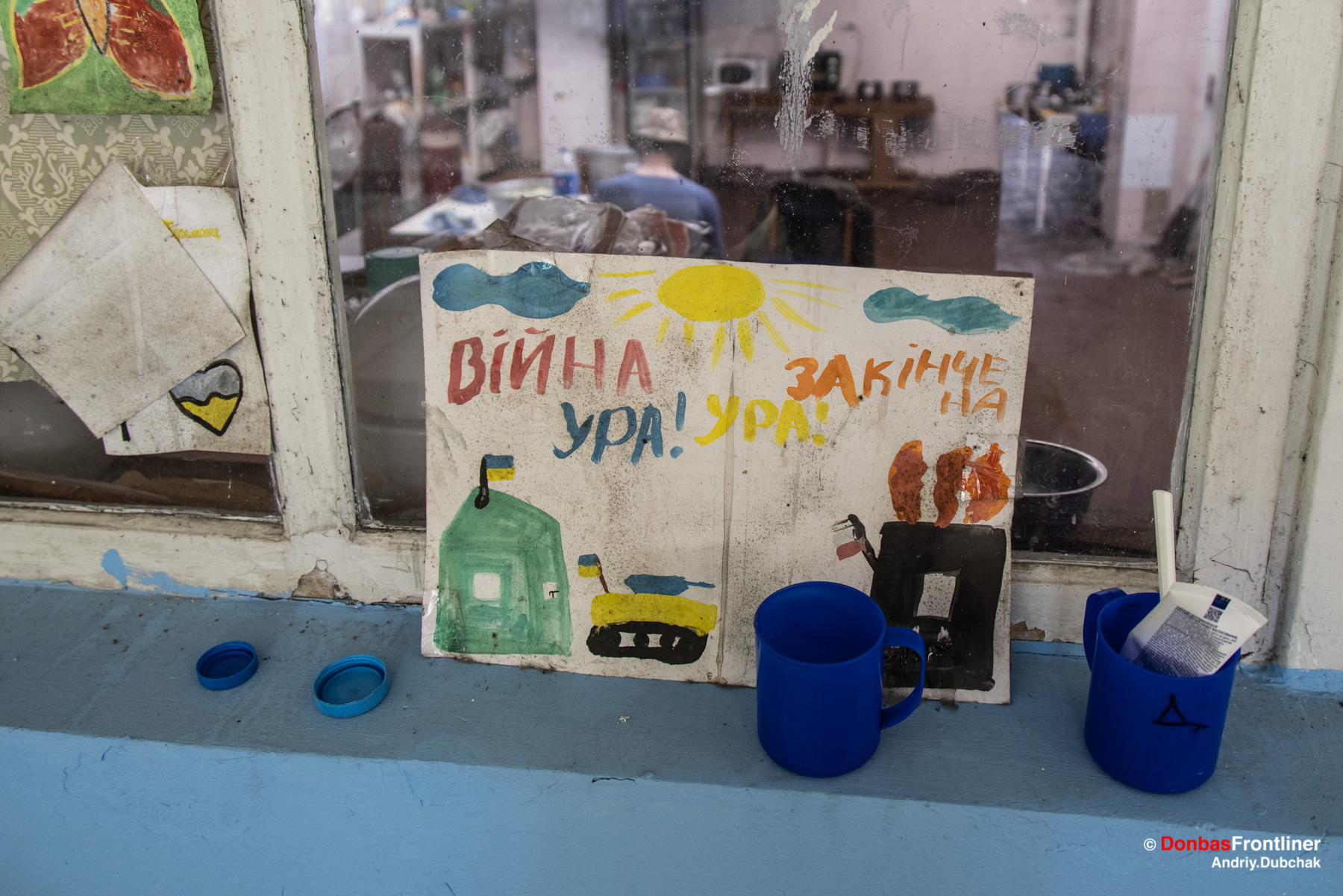
UKRAINIAN VERSION: «Сили випадкових операцій». Як «Госпітальєри» гартують бойових парамедиків
We really need your support of our independent reporters project Donbas Frontliner! Our Patreon: www.patreon.com/donbasfrontliner
Donbas Frontliner – Who we are?
Donbas Frontliner it is really interesting about Russian-Ukraine war reality! Find and follow us in social networks!
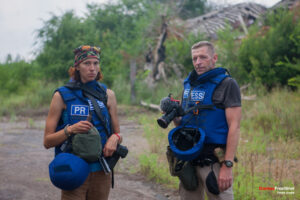
Authors: Andriy Dubchak and Olena Maksymenko. Translation George O’Hara.Photo and video are those of the authors.
